Nature in
Western Philosophy
Plate from Biologia centrali-americana. Insecta. Orthoptera
London/Albertus Magnus, O.P. (c. 1200–1280)./ Liquidambar formosana
西洋哲学における自然
Nature in
Western Philosophy
Plate from Biologia centrali-americana. Insecta. Orthoptera
London/Albertus Magnus, O.P. (c. 1200–1280)./ Liquidambar formosana
解説:池田光穂
「自然」という言葉は、哲学および自然哲学において、相互に関連した2
つの意味を持つ。一方では、自然界に存在するすべてのもの、つまり自然の法則が通常通りに作用する対象を意味する。他方では、個々のものの本質的な特性や
原因を意味する。
自然の意味と重要性をどう理解するかは、西洋文明の歴史の中で、形而上学や認識論といった哲学分野、神学、科学において常に議論されてきたテーマである。
自然とは何かについての議論ではなく、自然界に存在するものやそれらに支配されていると思われる規則的な法則の研究は、自然科学の分野である。
「自然」という言葉は、ラテン語の nātūra
に由来する。これは、誕生を表す動詞から派生した哲学用語であり、自然成長を表す動詞から派生した、ソクラテス以前のギリシャ語の phusis
の訳語として用いられていた。すでに古典時代には、哲学的な意味合いでこれらの言葉が使われ、2つの関連した意味が組み合わさっていた。その意味は、人間
の思惑や神の介入、あるいは考察の対象となっている自然物にとって正常と考えられるもの以外の外部からの「干渉」なしに、物事が「自然に」起こる方法を指
すという共通点がある。
自然に対する理解は、それが登場する作品のテーマや時代によって異なる。例えば、アリストテレスの自然物性についての説明は、現代の哲学や科学の著作にお
ける自然物性の意味とは異なります。また、他の科学や慣用的な用法とも異なる場合がある。
★西洋哲学における「自
然」の概念(「東洋哲学における自然」の説
明は割愛しています)
| Nature
has two
inter-related meanings in philosophy and natural philosophy. On the one
hand, it means the set of all things which are natural, or subject to
the normal working of the laws of nature. On the other hand, it means
the essential properties and causes of individual things. How to understand the meaning and significance of nature has been a consistent theme of discussion within the history of Western Civilization, in the philosophical fields of metaphysics and epistemology, as well as in theology and science. The study of natural things and the regular laws which seem to govern them, as opposed to discussion about what it means to be natural, is the area of natural science. The word "nature" derives from Latin nātūra, a philosophical term derived from the verb for birth, which was used as a translation for the earlier (pre-Socratic) Greek term phusis, derived from the verb for natural growth. Already in classical times, philosophical use of these words combined two related meanings which have in common that they refer to the way in which things happen by themselves, "naturally", without "interference" from human deliberation, divine intervention, or anything outside what is considered normal for the natural things being considered. Understandings of nature depend on the subject and age of the work where they appear. For example, Aristotle's explanation of natural properties differs from what is meant by natural properties in modern philosophical and scientific works, which can also differ from other scientific and conventional usage. |
「自然」という言葉は、哲学および自然哲学において、相互に関連した2
つの意味を持つ。
一方では、自然界に存在するすべてのもの、つまり自然の法則が通常通りに作用する対象を意味する。他方では、個々のものの本質的な特性や原因を意味する。 自然の意味と重要性をどう理解するかは、西洋文明の歴史の中で、形而上学や認識論といった哲学分野、神学、科学において常に議論されてきたテーマである。 自然とは何かについての議論ではなく、自然界に存在するものやそれらに支配されていると思われる規則的な法則の研究は、自然科学の分野である。 「自然」という言葉は、ラテン語の nātūra に由来する。これは、誕生を表す動詞から派生した哲学用語であり、自然成長を表す動詞から派生した、ソクラテス以前のギリシャ語の phusis の訳語として用いられていた。すでに古典時代には、哲学的な意味合いでこれらの言葉が使われ、2つの関連した意味が組み合わさっていた。その意味は、人間 の思惑や神の介入、あるいは考察の対象となっている自然物にとって正常と考えられるもの以外の外部からの「干渉」なしに、物事が「自然に」起こる方法を指 すという共通点がある。 自然に対する理解は、それが登場する作品のテーマや時代によって異なる。例えば、アリストテレスの自然物性についての説明は、現代の哲学や科学の著作にお ける自然物性の意味とは異なります。また、他の科学や慣用的な用法とも異なる場合がある。 |
| Classical nature and
Aristotelian metaphysics Main article: Physis The Physics (from ta phusika "the natural [things]") is Aristotle's principal work on nature. In Physics II.1, Aristotle defines a nature as "a source or cause of being moved and of being at rest in that to which it belongs primarily".[1] In other words, a nature is the principle within a natural raw material that is the source of tendencies to change or rest in a particular way unless stopped. For example, a rock would fall unless stopped. Natural things stand in contrast to artifacts, which are formed by human artifice, not because of an innate tendency. (The raw materials of a bed have no tendency to become a bed.) In terms of Aristotle's theory of four causes, the word natural is applied both to the innate potential of matter cause and the forms which the matter tends to become naturally.[2] According to Leo Strauss,[3] the beginning of Western philosophy involved the "discovery or invention of nature" and the "pre-philosophical equivalent of nature" was supplied by "such notions as 'custom' or 'ways'". In ancient Greek philosophy on the other hand, Nature or natures are ways that are "really universal" "in all times and places". What makes nature different is that it presupposes not only that not all customs and ways are equal, but also that one can "find one's bearings in the cosmos" "on the basis of inquiry" (not for example on the basis of traditions or religion). To put this "discovery or invention" into the traditional terminology, what is "by nature" is contrasted to what is "by convention". The concept of nature taken this far remains a strong tradition in modern Western thinking. Science, according to Strauss' commentary of Western history is the contemplation of nature, while technology was or is an attempt to imitate it.[4] Going further, the philosophical concept of nature or natures as a special type of causation - for example that the way particular humans are is partly caused by something called "human nature" is an essential step towards Aristotle's teaching concerning causation, which became standard in all Western philosophy until the arrival of modern science.  Depiction of Aristotle Whether it was intended or not, Aristotle's inquiries into this subject were long felt to have resolved the discussion about nature in favor of one solution. In this account, there are four different types of cause: The material cause is the "raw material" - the matter which undergoes change. One of the causes of a statue being what it is might be that it is bronze. All meanings of the word nature encompass this simple meaning. The efficient cause is the motion of another thing, which makes a thing change, for example a chisel hitting a rock causes a chip to break off. This is the way which the matter is forming into a form so that it become substance like what Aristotle said that a substance must have a form and matter in order to call it substance. This is the motion of changing a single being into two. This is the most obvious way in which cause and effect works, as in the descriptions of modern science. But according to Aristotle, this does not yet explain that of which the motion is, and we must "apply ourselves to the question whether there is any other cause per se besides matter".[5] The formal cause is the form or idea which serves as a template towards which things develop - for example following an approach based upon Aristotle we could say that a child develops in a way partly determined by a thing called "human nature". Here, nature is a cause. The final cause is the aim towards which something is directed. For example, a human aims at something perceived to be good, as Aristotle says in the opening lines of the Nicomachean Ethics. The formal and final cause are an essential part of Aristotle's "Metaphysics" - his attempt to go beyond nature and explain nature itself. In practice they imply a human-like consciousness involved in the causation of all things, even things which are not man-made. Nature itself is attributed with having aims.[6] The artificial, like the conventional therefore, is within this branch of Western thought, traditionally contrasted with the natural. Technology was contrasted with science, as mentioned above. And another essential aspect to this understanding of causation was the distinction between the accidental properties of a thing and the substance - another distinction which has lost favor in the modern era, after having long been widely accepted in medieval Europe. To describe it another way, Aristotle treated organisms and other natural wholes as existing at a higher level than mere matter in motion. Aristotle's argument for formal and final causes is related to a doctrine about how it is possible that people know things: "If nothing exists apart from individual things, nothing will be intelligible; everything will be sensible, and there will be no knowledge of anything—unless it be maintained that sense-perception is knowledge".[7] Those philosophers who disagree with this reasoning therefore also see knowledge differently from Aristotle. Aristotle then, described nature or natures as follows, in a way quite different from modern science:[8] "Nature" means: (a) in one sense, the genesis of growing things — as would be suggested by pronouncing the υ of φύσις[9] long—and (b) in another, that immanent thing from which a growing thing first begins to grow. (c) The source from which the primary motion in every natural object is induced in that object as such. All things are said to grow which gain increase through something else by contact and organic unity (or adhesion, as in the case of embryos). Organic unity differs from contact; for in the latter case there need be nothing except contact, but in both the things which form an organic unity there is some one and the same thing which produces, instead of mere contact, a unity which is organic, continuous and quantitative (but not qualitative). Again, "nature" means (d) the primary stuff, shapeless and unchangeable from its own potency, of which any natural object consists or from which it is produced; e.g., bronze is called the "nature" of a statue and of bronze articles, and wood that of wooden ones, and similarly in all other cases. For each article consists of these "natures," the primary material persisting. It is in this sense that men call the elements of natural objects the "nature," some calling it fire, others earth or air or water, others something else similar, others some of these, and others all of them. Again in another sense "nature" means (e) the substance of natural objects; as in the case of those who say that the "nature" is the primary composition of a thing, or as Empedocles says: Of nothing that exists is there nature, but only mixture and separation of what has been mixed; nature is but a name given to these by men. Hence as regards those things which exist or are produced by nature, although that from which they naturally are produced or exist is already present, we say that they have not their nature yet unless they have their form and shape. That which comprises both of these exists by nature; e.g. animals and their parts. And nature is both the primary matter (and this in two senses: either primary in relation to the thing, or primary in general; e.g., in bronze articles the primary matter in relation to those articles is bronze, but in general it is perhaps water—that is if all things which can be melted are water) and the form or essence, i.e. the end of the process, of generation. Indeed from this sense of "nature," by an extension of meaning, every essence in general is called "nature," because the nature of anything is a kind of essence. From what has been said, then, the primary and proper sense of "nature" is the essence of those things which contain in themselves as such a source of motion; for the matter is called "nature" because it is capable of receiving the nature, and the processes of generation and growth are called "nature" because they are motions derived from it. And nature in this sense is the source of motion in natural objects, which is somehow inherent in them, either potentially or actually. — Metaphysics 1014b-1015a, translated by Hugh Tredennick, emphasis added.[a] It has been argued, as will be explained below, that this type of theory represented an oversimplifying diversion from the debates within Classical philosophy, possibly even that Aristotle saw it as a simplification or summary of the debates himself. But in any case the theory of the four causes became a standard part of any advanced education in the Middle Ages. |
古典的自然観とアリストテレスの形而上学 主な記事: 物理 『自然学』(原題:Physics)は、アリストテレスの自然に関する主要な著作である。『自然学』第2巻第1章で、アリストテレスは自然を「主にそれ自 身のものであるものにおいて、動くことや静止することの原因や源」と定義している[1]。言い換えれば、自然とは、特定の方法で変化したり静止したりする 傾向の源であり、止めない限りその傾向が続く、天然の原材料の中にある原理である。例えば、岩は止めない限り落ちていく。天然のものは、人間の技術によっ て作られた人工物とは対照的である。人工物は、生まれ持った傾向によるものではなく、人間の技術によって作られたものである。(ベッドの原材料がベッドに なる傾向を持っているわけではない。)アリストテレスの四原因説では、自然という言葉は、物質的原因の生まれ持った潜在性と、物質が自然に成り得る形の両 方に適用される[2]。 レオ・シュトラウスによると[3]、西洋哲学の始まりは「自然の発見または 発明」であり、「哲学以前の自然」は「習慣」や「慣習」などの概念によって説明 されていた。一方、古代ギリシャ哲学における自然あるいは諸自然は、「あらゆる時代と場所において」「本当に普遍的」なあり方である。自然を特徴づけるの は、すべての習慣やあり方が等しいわけではないという前提だけでなく、伝統や宗教ではなく、「探究に基づいて」(「宇宙の中で自分の位置を見定める」)こ とができるという前提である。この「発見または発明」を伝統的な用語で表現すると、「天性によるもの」は「慣習によるもの」と対比される。このようにとら えられた自然観は、現代の西洋思想においても強い伝統として受け継がれている。ストラウスの西洋史の解説によると、科学とは自然を考察することであり、一 方、技術は自然を模倣しようとする試みであった、あるいは今もそうである[4]。 さらに踏み込んで言えば、自然あるいは自然という特別な因果関係についての哲学的概念、例えば、ある特定の人間のあり方は「人間性」と呼ばれるものによっ て部分的に引き起こされるという概念は、近代科学の到来まで西洋哲学の標準となった、アリストテレスの因果関係に関する教えへの重要なステップである。  アリストテレスの描写 意図的であったかどうかは別として、アリストテレスがこの主題について探求したことは、長い間、自然についての議論をひとつの解決策に有利に解決したと受 け止められてきた。この説明では、4つの異なるタイプの原因がある。 物質的原因とは「原材料」であり、変化を受ける物質のことである。ある像が像であることのひとつの原因として、それが青銅製であることが挙げられるかもし れない。自然という言葉の意味はすべて、この単純な意味を含んでいる。 能因とは、別のものの動きによって物体が変化することである。例えば、ノミが岩に当たると欠片が割れる。これは、アリストテレスが物質は形と物質を持つこ とで初めて物質と呼べる、と述べたように、物質が形になる方法である。これは、一つの存在を二つに変化させる動きである。これは、現代科学の記述に見られ るような、因果関係が最も明白に作用する方法である。しかしアリストテレスによると、これはまだ運動の原因を説明したものではなく、「物質以外にそれ自体 として他の原因があるかどうか」を問う必要がある[5]。 形式的原因とは、物事が発展していくための雛形となる形やアイデアのことである。例えば、アリストテレスの考え方を踏まえると、子どもは「人間性」と呼ば れるものによって部分的に決定される方法で発達すると言える。ここでいう「人間性」は原因である。 最終的な原因は、何かが向かっている目標である。例えば、人間は良いと認識されるものを目指すと、アリストテレスは『ニコマコス倫理学』の冒頭で述べてい る。 形式的原因と最終的原因は、アリストテレスの「形而上学」の重要な部分である。自然を超越し、自然そのものを説明しようとする試みである。実際には、それ らは、人間が作り出していないものも含め、あらゆるものの因果関係に関与する人間のような意識を意味している。自然それ自体にも目的があると考えられてい る[6]。 人工物は、慣習的なものと同様に、西洋思想のこの一分野に属し、伝統的に自然とは対照的に考えられてきた。 テクノロジーは、前述の通り、科学と対比されてきた。 また、この因果関係の理解に不可欠なもう一つの側面は、物事の偶発的な性質と本質との区別であった。この区別も、中世ヨーロッパでは広く受け入れられてい たが、現代では支持を失っている。 別の言い方をすれば、アリストテレスは、生物やその他の自然界の存在を、単なる運動する物質よりも高い次元に存在するものとして扱っていた。アリストテレ スの形式原因と最終原因に関する議論は、人が物事を知ることができる理由に関する教義と関連している。「個々の物事以外に何も存在しないのであれば、理解 できるものは何もないだろう。すべては感覚的なものとなり、何事についても知識は得られないだろう。感覚的な知覚が知識である、と主張しない限りは。」 [7] この推論に同意しない哲学者たちは、したがってアリストテレスとは知識に対する考え方が異なる。 アリストテレスは、自然あるいは諸自然について、現代の科学とは全く異なる方法で次のように説明している[8]。 「自然」とは、 (a) ある意味では、成長するものの起源を意味する。これは、φύσις[9]のυを長く発音すると示唆されるように、 (b) 成長するものが最初に成長し始める内在的なものを意味する。 (c) あらゆる自然物において、その物自体が最初に動き出すきっかけとなる源。 接触や有機的結合(胚の場合のように接着)によって、他の何かを通して増加するものはすべて成長すると言われている。有機的統一は接触とは異なる。後者の 場合、接触以外に何も必要ないが、有機的統一を形成する両者では、単なる接触ではなく、有機的、連続的、量的な(しかし質的ではない)統一を生み出す、あ る一つの同じものが必要である。繰り返すが、「自然」とは (d) 自然物からなり、あるいは自然物が生み出される、形がなく、その潜在能力から変化することのない原初的な物質を意味する。例えば、ブロンズは像やブロンズ 製品の「自然」と呼ばれ、木は木製品の「自然」と呼ばれ、他のすべてのケースでも同様である。各製品はこれらの「自然」からなり、原初的な物質は不変であ る。自然物に含まれる要素を「自然」と呼ぶのは、この意味でであり、ある者は火、ある者は土や空気や水、また他の者はそれに似た別のものを、またある者は それらのうちのいくつかを、また他の者はそれらすべてを自然と呼ぶ。 (e) 自然物の本質。自然物が持つ主要な構成を「自然」と呼ぶ場合、あるいはエンペドクレスが言うように、 自然は存在するものの中に存在するのではなく、混合されたものの混合と分離の中にのみ存在する。自然とは、人間がそれらに与えた名称にすぎない。したがっ て、自然によって存在したり生成されたりするものに関しては、それらが自然に生成されたり存在したりするものはすでに存在しているが、それらが形や姿を持 たない限り、それらはまだ自然を持っていないと言う。これら両方を構成するものは自然によって存在している。例えば、動物とその部分である。そして自然と は、第一物質(これは2つの意味で用いられる。すなわち、物との関係における第一物質、あるいは一般的な意味における第一物質である。例えば青銅製品にお いて、青銅製品との関係における第一物質は青銅であるが、一般的な意味においてはおそらく水である。すなわち、溶かすことのできるすべての物質が水である ならば)と、生成の過程における最終結果である形または本質の両方である。実際、この「自然」の意味から、意味の拡張により、あらゆる本質は一般的に「自 然」と呼ばれる。なぜなら、あらゆるものの本質は本質の一種だからである。以上のことから、「自然」の本来の意味は、それ自体が運動の源となるものの本質 である。物事が「自然」と呼ばれるのは、それが自然を受け入れる能力を持っているからであり、生成や成長のプロセスが「自然」と呼ばれるのは、それらが自 然から派生した運動だからである。そして、この意味における自然とは、自然物における運動の源であり、潜在的または実際に何らかの形でそれらに内在するも のである。 —『形而上学』1014b-1015a、ヒュー・トレデンニック訳、強調は引用者による[a]。 この種の理論は、以下に説明するように、古典哲学における議論から逸脱した単純化であると議論されてきた。おそらく、アリストテレス自身が議論の単純化あ るいは要約として捉えていた可能性もある。しかし、いずれにせよ、四原因説は中世におけるあらゆる高度な教育において標準的な内容となった。 |
Modern science and laws of
nature: trying to avoid metaphysics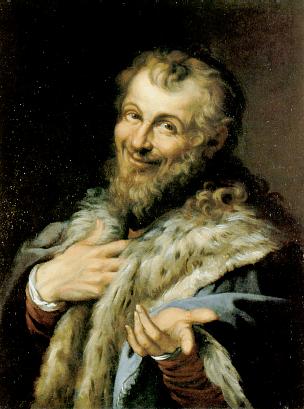 A Renaissance imagined representation of Democritus, the laughing philosopher, by Agostino Carracci In contrast, Modern Science took its distinctive turn with Francis Bacon, who rejected the four distinct causes, and saw Aristotle as someone who "did proceed in such a spirit of difference and contradiction towards all antiquity: undertaking not only to frame new words of science at pleasure, but to confound and extinguish all ancient wisdom". He felt that lesser known Greek philosophers such as Democritus "who did not suppose a mind or reason in the frame of things", have been arrogantly dismissed because of Aristotelianism leading to a situation in his time wherein "the search of the physical causes hath been neglected, and passed in silence".[38] And so Bacon advised... Physic doth make inquiry, and take consideration of the same natures : but how? Only as to the material and efficient causes of them, and not as to the forms. For example; if the cause of whiteness in snow or froth be inquired, and it be rendered thus, that the subtile intermixture of air and water is the cause, it is well rendered ; but, nevertheless, is this the form of whiteness? No; but it is the efficient, which is ever but vehiculum formæ. This part of metaphysique I do not find laboured and performed... — Francis Bacon, Advancement of Learning II.VII.6 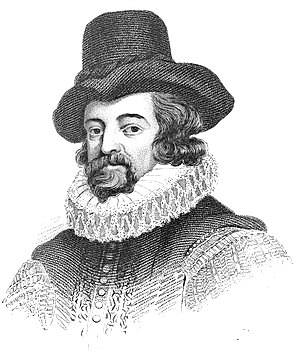 Francis Bacon In his Novum Organum Bacon argued that the only forms or natures we should hypothesize are the "simple" (as opposed to compound) ones such as the ways in which heat, movement, etc. work. For example, in aphorism 51 he writes: 51. The human understanding is, by its own nature, prone to abstraction, and supposes that which is fluctuating to be fixed. But it is better to dissect than abstract nature; such was the method employed by the school of Democritus, which made greater progress in penetrating nature than the rest. It is best to consider matter, its conformation, and the changes of that conformation, its own action, and the law of this action or motion, for forms are a mere fiction of the human mind, unless you will call the laws of action by that name. Following Bacon's advice, the scientific search for the formal cause of things is now replaced by the search for "laws of nature" or "laws of physics" in all scientific thinking. To use Aristotle's well-known terminology these are descriptions of efficient cause, and not formal cause or final cause. It means modern science limits its hypothesizing about non-physical things to the assumption that there are regularities to the ways of all things which do not change. These general laws, in other words, replace thinking about specific "laws", for example "human nature". In modern science, human nature is part of the same general scheme of cause and effect, obeying the same general laws, as all other things. The above-mentioned difference between accidental and substantial properties, and indeed knowledge and opinion, also disappear within this new approach that aimed to avoid metaphysics. As Bacon knew, the term "laws of nature" was one taken from medieval Aristotelianism. St Thomas Aquinas for example, defined law so that nature really was legislated to consciously achieve aims, like human law: "an ordinance of reason for the common good, made by him who has care of the community and promulgated".[39] In contrast, roughly contemporary with Bacon, Hugo Grotius described the law of nature as "a rule that [can] be deduced from fixed principles by a sure process of reasoning".[40] And later still, Montesquieu was even further from the original legal metaphor, describing laws vaguely as "the necessary relations deriving from the nature of things".[41] 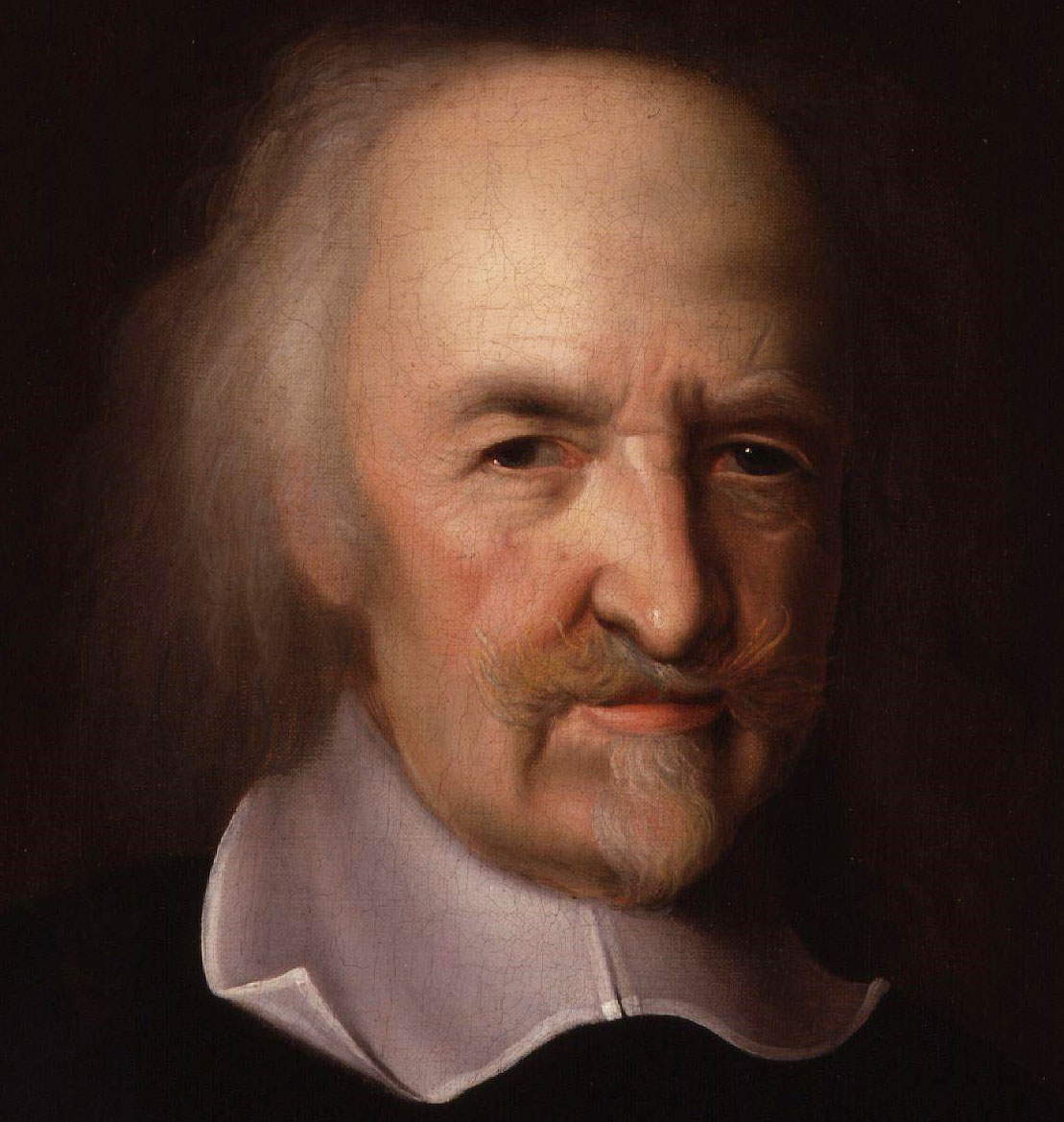 Thomas Hobbes One of the most important implementors of Bacon's proposal was Thomas Hobbes, whose remarks concerning nature are particularly well-known. His most famous work, Leviathan, opens with the word "Nature" and then parenthetically defines it as "the art whereby God hath made and governes the world". Despite this pious description, he follows a Baconian approach. Following his contemporary, Descartes, Hobbes describes life itself as mechanical, caused in the same way as clockwork: For seeing life is but a motion of Limbs, the beginning whereof is in some principall part within; why may we not say, that all Automata (Engines that move themselves by springs and wheeles as doth a watch) have an artificiall life? On this basis, already being established in natural science in his lifetime, Hobbes sought to discuss politics and human life in terms of "laws of nature". But in the new modern approach of Bacon and Hobbes, and before them Machiavelli (who however never clothed his criticism of the Aristotelian approach in medieval terms like "laws of nature"),[42] such laws of nature are quite different to human laws: they no longer imply any sense of better or worse, but simply how things really are, and, when in reference to laws of human nature, what sorts of human behavior can be most relied upon. |
近代科学と自然法則:形而上学を避けようとする アゴスティーノ・カラッチによる、笑う哲学者デモクリトスのルネサンス風の想像図 それとは対照的に、近代科学は、4つの明確な原因を否定し、アリストテレスを「古代のすべてに対して、そのような差異と矛盾の精神で進んだ人物」とみなし たフランシス・ベーコンによって、独自の方向性を打ち出した。彼は、デモクリトスのようなあまり知られていないギリシャの哲学者たちが、「物事の枠組みの 中に心や理性を想定しなかった」ために傲慢に退けられてきたと感じていた。そして、アリストテレス主義により、彼の時代には「物理的原因の探索が軽視さ れ、黙殺されてきた」状況が生じていた[38]。 そこでベーコンは次のように助言した。 物理学者は同じ性質を調査し、考慮する。しかし、どのように?それは、物質的原因と効力的原因についてのみであり、形についてはそうではない。例えば、雪 や泡の白さの要因を尋ね、空気と水の微妙な混合が要因であると説明された場合、それはうまく説明されているが、しかし、それでもこれは白さの形だろうか? いいえ、それは効力的なものであり、それは常に形を運ぶ手段にすぎない。形而上学のこの部分については、私は労力を費やして行われたとは思わない... — フランシス・ベーコン、『学問の進歩』II.VII.6  フランシス・ベーコン ベーコンは『ノヴム・オルガヌム』の中で、私たちが仮説を立てるべき唯一の形式や性質は、熱や運動などの働き方のような「単純な」(複合的なものとは対照 的な)ものであると主張した。例えば、格言集第51条で彼は次のように書いている。 51.人間の理解力は、その性質上、抽象化に傾きやすく、変動するものを固定したものだと考える。しかし、抽象化よりも分析するほうが良い。デモクリトス の学派が採用した方法は、他の学派よりも自然の本質を突き止める上で大きな進歩を遂げた。物質、その構造、その構造の変化、物質自身の作用、そしてこの作 用または運動の法則について考えるのが最善である。なぜなら、作用の法則をそのように呼ぶのでなければ、形は人間の心の中の単なる空想にすぎないからだ。 ベーコンのアドバイスに従い、物事の形式的原因を科学的に探求するという考えは、現在ではあらゆる科学的思考における「自然の法則」または「物理法則」の 探求に置き換えられている。アリストテレスの有名な用語を用いると、これらは「結果の原因」の説明であり、「形式的原因」や「最終的原因」ではない。つま り、現代科学は、物理的ではない事柄についての仮説を、変化しないすべてのものの方法に規則性があるとする仮定に限定しているということだ。 これらの一般的な法則は、言い換えれば、例えば「人間の本性」のような特定の「法則」についての思考に置き換わる。現代科学では、人間の本質も他のすべて のものと同様に、原因と結果の一般的な仕組みの一部であり、同じ一般的な法則に従う。 偶然的性質と本質的性質、そして知識と意見の違いも、形而上学を避けることを目的としたこの新しいアプローチの中では消える。 ベーコンが知っていたように、「自然の法則」という言葉は中世のアリストテレス主義から引用されたものである。例えば、聖トマス・アクィナスは、自然が人 間の法律のように、意識的に目的を達成するために制定されたものであると定義した。「共同体の管理者が制定し、公布する、公益のための理性の規定」 [39]。これに対し、ベーコンとほぼ同時代のヒューゴ・グロティウスは、自然法を「確かな推論のプロセスによって、固定された原則から導き出される規 則」[40]と表現した。 ] さらに後年、モンテスキューは、法律を「物事の性質から生じる必然的な関係」と曖昧に表現するなど、法律の比喩としての原典からさらにかけ離れたものと なった[41]。  トマス・ホッブズ ベーコンの提案を最もよく実践した人物の一人がトマス・ホッブズであり、彼の自然に関する発言は特に有名である。彼の最も有名な著作『リヴァイアサン』は 「自然」という言葉で始まり、その後に「神が世界を作り、支配する術」と定義されている。このような敬虔な表現にもかかわらず、ホッブズはベーコンの考え 方に従っている。同時代のデカルトにならって、ホッブズは生命そのものを機械的なものと捉え、時計仕掛けと同じ方法で生命は生み出されるとしている。 生命とは四肢の動きにすぎず、その始まりは体内の主要な部分にある。だから、ゼンマイや歯車によって自ら動く機械(時計など)はすべて人工生命を持ってい る、と言ってもいいのではないか? ホッブズは、この考え方を基礎に、すでに存命中に自然科学の分野で確立していた「自然の法則」という観点から政治や人間の人生について論じようとした。し かし、ベーコンやホッブズ、そして彼らより前のマキャベリ(ただし、彼はアリストテレスのアプローチに対する批判を「自然の法則」のような中世的な用語で 表現することはなかった)[42]による近代的なアプローチでは、そのような自然の法則は人間の法律とはまったく異なる。それらはもはや善悪の感覚を意味 せず、単に物事が実際どうであるか、そして人間の本性の法則に関して言えば、どのような人間の行動が最も信頼に足るかを示しているだけである。 |
"Late modern" nature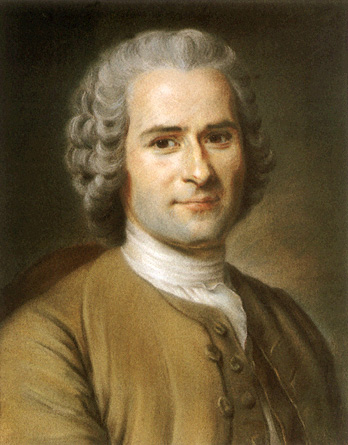 Jean-Jacques Rousseau: a civilized man, but a person who questioned whether civilization was according to human nature. Having disconnected the term "law of nature" from the original medieval metaphor of human-made law, the term "law of nature" is now used less than in early modern times. To take the critical example of human nature, as discussed in ethics and politics, once early modern philosophers such as Hobbes had described human nature as whatever you could expect from a mechanism called a human, the point of speaking of human nature became problematic in some contexts. In the late 18th century, Rousseau took a critical step in his Second Discourse, reasoning that human nature as we know it, rational, and with language, and so on, is a result of historical accidents, and the specific up-bringing of an individual. The consequences of this line of reasoning were to be enormous. It was all about the question of nature. In effect it was being claimed that human nature, one of the most important types of nature in Aristotelian thinking, did not exist as it had been understood to exist. |
「後期近代」の自然 ジャン・ジャック・ルソー:文明人でありながら、文明が人間の本性に沿ったものなのかを疑問視した人物。 「自然の法」という言葉を、中世の人為的な法のメタファーから切り離したことで、「自然の法」という言葉は、初期近代よりも使用されなくなった。 倫理や政治学で議論される人間の本性の批判的な例を挙げると、かつてホッブズなどの初期近代の哲学者たちは人間の本性を「人間というメカニズムから期待さ れるもの」と表現していたため、状況によっては人間の本性を語る意味が問題となった。 18世紀後半、ルソーは『第二談話』の中で、私たちが知っているような理性や言語能力を持つ人間性などは、歴史的な偶然と個人の特定の生育環境の結果であ ると論じ、批判的な一歩を踏み出した。この論考の帰結は甚大なものとなった。それはすべて、人間の本質に関する問題であった。つまり、アリストテレスの思 想において最も重要な自然の一種である人間の本質は、これまで理解されてきたような存在ではなかったと主張されたのである。 |
| The survival of metaphysics The approach of modern science, like the approach of Aristotelianism, is apparently not universally accepted by all people who accept the concept of nature as a reality which we can pursue with reason. Bacon and other opponents of Metaphysics claim that all attempts to go beyond nature are bound to fall into the same errors, but Metaphysicians themselves see differences between different approaches. Immanuel Kant for example, expressed the need for a Metaphysics in quite similar terms to Aristotle. ...though we cannot know these objects as things in themselves, we must yet be in a position at least to think them as things in themselves; otherwise we should be landed in the absurd conclusion that there can be appearance without anything that appears. — Critique of Pure Reason pp. Bxxvi-xxvii As in Aristotelianism then, Kantianism claims that the human mind must itself have characteristics which are beyond nature, metaphysical, in some way. Specifically, Kant argued that the human mind comes ready-made with a priori programming, so to speak, which allows it to make sense of nature. The study of nature without metaphysics Authors from Nietzsche to Richard Rorty have claimed that science, the study of nature, can and should exist without metaphysics. But this claim has always been controversial. Authors like Bacon and Hume never denied that their use of the word "nature" implied metaphysics, but tried to follow Machiavelli's approach of talking about what works, instead of claiming to understand what seems impossible to understand. |
形而上学の存続 近代科学のアプローチは、アリストテレスのアプローチと同様、理性によって追求できる現実としての自然という概念を受け入れるすべての人々から普遍的に受 け入れられているわけではない。 ベーコンやその他の形而上学の反対派は、自然を超えるあらゆる試みは同じ過ちに陥るだろうと主張しているが、形而上学者自身は異なるアプローチの違いを認 識している。 例えばイマヌエル・カントは、アリストテレスとほとんど同じような言葉で形而上学の必要性を説いた。... これらの対象をそれ自体として知ることができないとしても、少なくともそれ自体として考えることはできるはずである。さもなければ、何も現れていないの に、見えるものがあるという不条理な結論に行き着いてしまうだろう。 —『純粋理性批判』pp. Bxxvi-xxvii アリストテレス主義と同様に、カント主義は人間の心には、自然を超越した形而上学的な性質が備わっているはずだと主張している。具体的には、カントは人間 の心には、いわば先験的なプログラミングが備わっており、それにより自然を理解できると論じた。 形而上学抜きで自然を研究する ニーチェからリチャード・ローティに至るまでの著者は、科学、すなわち自然を研究する学問は形而上学抜きでも存在しうるし、存在すべきだと主張してきた。 しかし、この主張は常に物議を醸してきた。ベーコンやヒュームのような著者は、「自然」という言葉を使うことが形而上学を意味することを否定することはな かったが、理解不可能と思われるものを理解していると主張するのではなく、実際に機能しているものを語るというマキャベリのやり方を試みた。 |
| A priori and a posteriori Aristotelianism Causality Empiricism Human nature Idealism Metaphysical naturalism Natural philosophy Nature Saṃsāra Naturphilosophie Philosophical naturalism Platonism Reality Truth |
先験的および後験的 アリストテレス主義 因果関係 経験主義 人間性 観念論 形而上学的自然主義 自然哲学 自然 輪廻 自然哲学 哲学的自然主義 プラトン主義 現実 真理 |
| https://en.wikipedia.org/wiki/Nature_(philosophy) |
|
| φύσις λέγεται ἕνα μὲν τρόπον ἡ
τῶν φυομένων γένεσις, οἷον εἴ τις ἐπεκτείνας λέγοι τὸ υ, ἕνα δὲ ἐξ οὗ
φύεται πρώτου τὸ φυόμενον ἐνυπάρχοντος: ἔτι ὅθεν ἡ κίνησις ἡ πρώτη ἐν
ἑκάστῳ τῶν φύσει ὄντων ἐν αὐτῷ ᾗ αὐτὸ [20] ὑπάρχει: φύεσθαι δὲ λέγεται
ὅσα αὔξησιν ἔχει δι᾽ ἑτέρου τῷ ἅπτεσθαι καὶ συμπεφυκέναι ἢ
προσπεφυκέναι ὥσπερ τὰ ἔμβρυα: διαφέρει δὲ σύμφυσις ἁφῆς, ἔνθα μὲν γὰρ
οὐδὲν παρὰ τὴν ἁφὴν ἕτερον ἀνάγκη εἶναι, ἐν δὲ τοῖς συμπεφυκόσιν ἔστι
τι ἓν τὸ αὐτὸ ἐν ἀμφοῖν ὃ ποιεῖ ἀντὶ τοῦ [25] ἅπτεσθαι συμπεφυκέναι καὶ
εἶναι ἓν κατὰ τὸ συνεχὲς καὶ ποσόν, ἀλλὰ μὴ κατὰ τὸ ποιόν. ἔτι δὲ φύσις
λέγεται ἐξ οὗ πρώτου ἢ ἔστιν ἢ γίγνεταί τι τῶν φύσει ὄντων, ἀρρυθμίστου
ὄντος καὶ ἀμεταβλήτου ἐκ τῆς δυνάμεως τῆς αὑτοῦ, οἷον ἀνδριάντος καὶ
τῶν σκευῶν τῶν χαλκῶν ὁ χαλκὸς ἡ [30] φύσις λέγεται, τῶν δὲ ξυλίνων
ξύλον: ὁμοίως δὲ καὶ ἐπὶ τῶν ἄλλων: ἐκ τούτων γάρ ἐστιν ἕκαστον
διασωζομένης τῆς πρώτης ὕλης: τοῦτον γὰρ τὸν τρόπον καὶ τῶν φύσει ὄντων
τὰ στοιχεῖά φασιν εἶναι φύσιν, οἱ μὲν πῦρ οἱ δὲ γῆν οἱ δ᾽ ἀέρα οἱ δ᾽
ὕδωρ οἱ δ᾽ ἄλλο τι τοιοῦτον λέγοντες, οἱ δ᾽ [35] ἔνια τούτων οἱ δὲ
πάντα ταῦτα. ἔτι δ᾽ ἄλλον τρόπον λέγεται ἡ φύσις ἡ τῶν φύσει ὄντων
οὐσία, οἷον οἱ λέγοντες τὴν φύσιν εἶναι τὴν πρώτην σύνθεσιν, ἢ ὥσπερ
Ἐμπεδοκλῆς λέγει ὅτι "φύσις οὐδενὸς ἔστιν ἐόντων, ἀλλὰ μόνον μῖξίς τε
διάλλαξίς τε μιγέντων ἔστι, φύσις δ᾽ ἐπὶ τοῖς ὀνομάζεται ἀνθρώποισιν.
"Empedocles Fr. 8 διὸ καὶ ὅσα φύσει ἔστιν ἢ γίγνεται, ἤδη ὑπάρχοντος ἐξ
οὗ πέφυκε γίγνεσθαι ἢ εἶναι, οὔπω φαμὲν [5] τὴν φύσιν ἔχειν ἐὰν μὴ ἔχῃ
τὸ εἶδος καὶ τὴν μορφήν. φύσει μὲν οὖν τὸ ἐξ ἀμφοτέρων τούτων ἐστίν,
οἷον τὰ ζῷα καὶ τὰ μόρια αὐτῶν: φύσις δὲ ἥ τε πρώτη ὕλη (καὶ αὕτη
διχῶς, ἢ ἡ πρὸς αὐτὸ πρώτη ἢ ἡ ὅλως πρώτη, οἷον τῶν χαλκῶν ἔργων πρὸς
αὐτὰ μὲν πρῶτος ὁ χαλκός, ὅλως δ᾽ [10] ἴσως ὕδωρ, εἰ πάντα τὰ τηκτὰ
ὕδωρ) καὶ τὸ εἶδος καὶ ἡ οὐσία: τοῦτο δ᾽ ἐστὶ τὸ τέλος τῆς γενέσεως.
μεταφορᾷ δ᾽ ἤδη καὶ ὅλως πᾶσα οὐσία φύσις λέγεται διὰ ταύτην, ὅτι καὶ ἡ
φύσις οὐσία τίς ἐστιν. ἐκ δὴ τῶν εἰρημένων ἡ πρώτη φύσις καὶ κυρίως
λεγομένη ἐστὶν ἡ οὐσία ἡ τῶν ἐχόντων [15] ἀρχὴν κινήσεως ἐν αὑτοῖς ᾗ
αὐτά: ἡ γὰρ ὕλη τῷ ταύτης δεκτικὴ εἶναι λέγεται φύσις, καὶ αἱ γενέσεις
καὶ τὸ φύεσθαι τῷ ἀπὸ ταύτης εἶναι κινήσεις. καὶ ἡ ἀρχὴ τῆς κινήσεως
τῶν φύσει ὄντων αὕτη ἐστίν, ἐνυπάρχουσά πως ἢ δυνάμει ἢ ἐντελεχείᾳ. |
自然は一方では成長するものの生成と呼ばれ、それが拡大されるとき、y
と呼ばれ、その一つは成長するものの最初のものであり、成長する最初のものである:
それゆえ、運動は、それまたはそれ自体において、自然のもののそれぞれにおいて最初のものであり、成長は、他のものを通して成長するものであり、胚のよう
に含まれる、またはあらかじめ含まれるものであると言われる:
そして、失語症の観念には、失語症以外のものは必要ないが、失語症の観念には、抽象の代わりに羊飼いの両方に同じものがあり、それは連続と量に従ってある
が、何に従ってあるのではない、という違いがある。そして自然は、自然のもののうちで、それ自身の力によって調節されず、変化しないものであり、それに
よって青銅の器の性質は銅と呼ばれ、青銅の器の性質は木の木と呼ばれると言われている:同様に残りのものについても:
なぜなら、これらのものは、それぞれ最初の物質から保存されていたからである。ものの道と本性の要素は、自然のものであり、一方は火と呼ばれ、他方は土と
呼ばれ、一方は空気と呼ばれ、一方は水と呼ばれ、一方はこのような他のものと呼ばれ、一方はこのようなものの一つと呼ばれ、他方はこのようなすべてのもの
と呼ばれる。エンペドクレスは、「自然は生けるものの本質ではなく、ただ混合されたもの、混合されたものの変化であり、自然はヒューマニズムと呼ばれる」
と言う。「エンペドクレスFr.8
διοと自然であるもの、あるいはつくられたもの、すでに存在するもの、そこから落ちてなったもの、あるいはあるもの、[5]自然が種と形を持っていない
ならば、われわれが見るように、自然は持っている。自然とは、これら両方のものであり、動物とその粒子の自然である:
そして自然とは、最初の物質(それもまた、それ自体において最初のもの、あるいは、真鍮の作品のように、すべてにおいて最初のものであり、そのうちの真鍮
が最初であり、すべてはおそらく水である。このため、すでに言われているように、すべての物質は自然と呼ばれ、その自然もまた物質と呼ばれる。それゆえ、
第一の自然は、主として、彼ら自身または彼らの中に運動の始まりを持つ者の物質と呼ばれる:それを受容する物質は自然と呼ばれ、その世代と性質は運動であ
る。そしてこれは、力が要素であるように、自然の被造物の運動の始まりである。 |
| Further reading Gerard Naddaf, The Greek Concept of Nature, New York, State University of New York Press, 2005. Ducarme, Frédéric; Couvet, Denis (2020). "What does 'nature' mean?". Palgrave Communications. 6 (14). Springer Nature. doi:10.1057/s41599-020-0390-y. |
さらに読む ジェラルド・ナダフ著『ギリシャの自然観』、ニューヨーク州立大学出版、2005年。 デュカルム、フレデリック、クーヴェ、ドゥニ共著(2020年)。「『自然』とは何を意味するのか?」Palgrave Communications. 6 (14). Springer Nature. doi:10.1057/s41599-020-0390-y. |
★西洋におけるネイチャー・ツーリズムは、「エココンシャスネス(生態系サービスに配慮した 意識化)」をベースにした、観光形態であるが、それは「東洋 哲学における自然」のようには、西洋の観光客は捉えているのではなく、自然は「生態学」 的知識が提供する「環境の中」で人間を取り戻す手段(=レクリエーションあるいは観光)とみなされている。
というのも、私はかつては少年だったし少女でもあった
樹木でもあり鳥でもある。大海のなかで迷子だった魚でもある
断片117
★エンペドクレス
| Empedocles
(/ɛmˈpɛdəkliːz/; Ancient Greek: Ἐμπεδοκλῆς; c. 494 – c. 434 BC, fl.
444–443 BC) was a Greek pre-Socratic philosopher and a native citizen
of Akragas, a Greek city in Sicily. Empedocles' philosophy is known
best for originating the cosmogonic theory of the four classical
elements. He also proposed forces he called Love and Strife which would
mix and separate the elements, respectively. Empedocles challenged the practice of animal sacrifice and killing animals for food. He developed a distinctive doctrine of reincarnation. He is generally considered the last Greek philosopher to have recorded his ideas in verse. Some of his work survives, more than is the case for any other pre-Socratic philosopher. Empedocles' death was mythologized by ancient writers, and has been the subject of a number of literary treatments. |
エンペドクレス(/ɛmˈpɛdəkliːz/; 古代ギリシャ語:
Ἐμπεδοκλῆς; 紀元前494年頃 -
紀元前434年頃、紀元前444年から443年頃が活動期)は、ギリシャのソクラテス以前の哲学者であり、シチリア島のギリシャ都市アクラガス出身の市民
であった。エンペドクレスの哲学は、四元素説という宇宙生成論を生み出したことで最もよく知られている。彼はまた、元素をミヘさせる「愛」と分離させる
「争い」という二つの力を提唱した。 エンペドクレスは動物犠牲や食用のための動物殺害の慣行に異議を唱えた。彼は独特の輪廻転生の教義を発展させた。一般的に、詩で思想を記録した最後のギリ シャ哲学者と見なされている。彼の著作の一部は現存しており、他のどの前ソクラテス派哲学者よりも多い。エンペドクレスの死は古代の作家たちによって神話 化され、数多くの文学作品の題材となってきた。 |
Life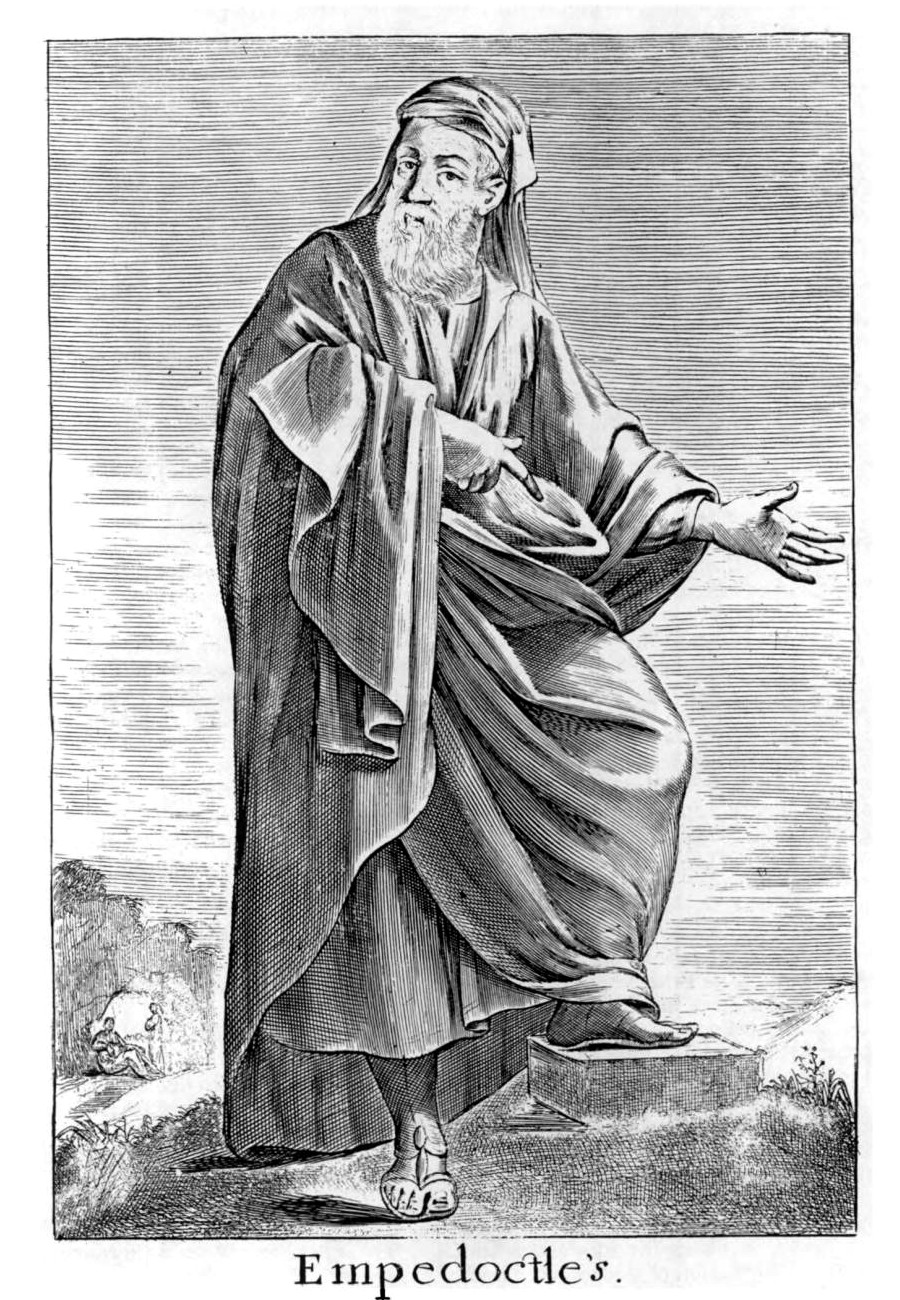 Empedocles, 17th-century engraving The exact dates of Empedocles' birth and death are unknown, and ancient accounts of his life conflict on the exact details. However, they agree that he was born in the early 5th century BC in the Greek city of Akragas in Magna Graecia, present-day Sicily.[1] Modern scholars believe the accuracy of the accounts that he came from a rich and noble family and that his grandfather, also named Empedocles, had won a victory in the horse race at Olympia in the 71st Olympiad (496–495 BC).[a] Little else can be determined with accuracy.[1] Primary sources of information on the life of Empedocles come from the Hellenistic period, several centuries after his own death and long after any reliable evidence about his life would have perished.[2] Modern scholarship generally believes that these biographical details, including Aristotle's assertion that he was the "father of rhetoric",[b] his chronologically impossible tutelage under Pythagoras, and his employment as a doctor and miracle worker, were fabricated from interpretations of Empedocles' poetry, as was common practice for the biographies written during this time.[2] |
エンペドクレス 17世紀の版画 エンペドクレスの生没年は正確には知られていない。古代の記録も詳細については矛盾している。しかし、彼が紀元前5世紀初頭にマグナ・グラエキア(現在の シチリア島)のギリシャ都市アクラガスで生まれたという点では一致している。[1] 現代の学者は、彼が裕福で高貴な家系の出身であり、祖父(同じくエンペドクレスという名)が第71回オリンピア競技大会(紀元前496-495年)の競馬 で勝利を収めたという記述の正確性を認めている。[a] それ以外の事実は正確に特定できない。[1] エンペドクレスの生涯に関する一次資料は、彼の死後数世紀を経たヘレニズム時代のものであり、彼の人生に関する信頼できる証拠が失われて久しい時期のもの だ。[2] 現代の研究では、これらの伝記的詳細——アリストテレスが主張した「修辞学の父」[b]という称号、年代的に不可能なピタゴラスへの師事、医師兼奇跡行者 としての活動——は、当時の伝記作法に則りエンペドクレスの詩の解釈から捏造されたものと広く考えられている。[2] |
Death and legacy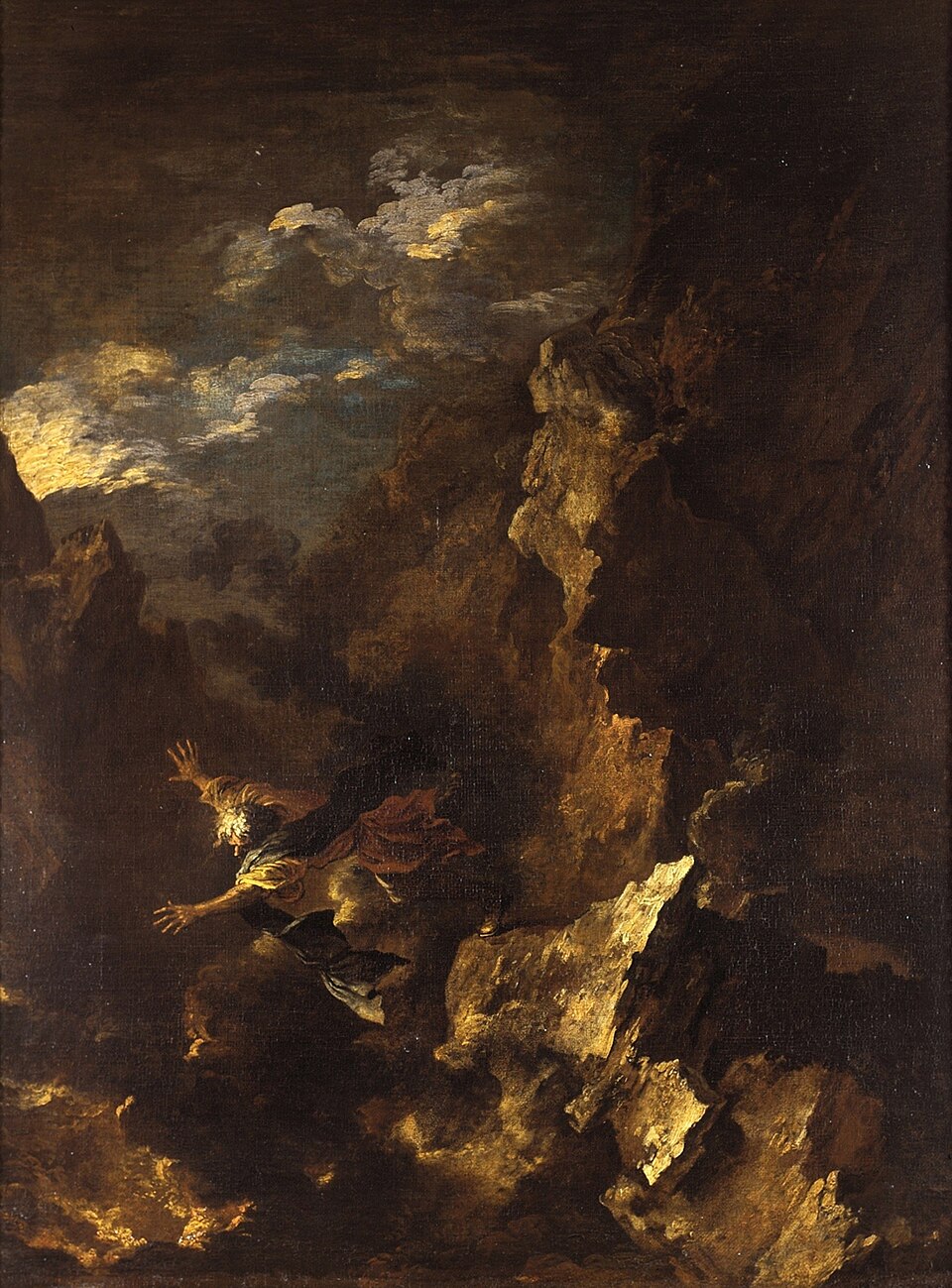 The Death of Empedocles by Salvator Rosa (1615–1673), depicting the legendary alleged suicide of Empedocles jumping into Mount Etna in Sicily According to Aristotle, Empedocles died at the age of 60 (c. 430 BC), but other writers have him living as long as 109 years.[c] Likewise, myths survive about his death: a tradition traced to Heraclides Ponticus posits that some force removed him from Earth somehow, while another tradition had him die in the flames of Sicily’s Mount Etna.[d] Diogenes Laërtius records the legend that Empedocles threw himself into Mount Etna so people would believe his body had vanished and he had turned into an immortal god;[e] the volcano, however, threw back one of his bronze sandals, revealing the deceit. Another legend maintains that he jumped into the volcano to prove to his disciples that he was immortal: he believed he would come back as a god after being consumed by the fire. In Icaro-Menippus [it], a comedic dialogue written by the second-century satirist Lucian of Samosata, Empedocles's final fate is re-imagined. Rather than being incinerated in Mount Etna, one of its eruptions carries him up into the heavens. Although singed by the ordeal, Empedocles survives and continues his life on the Moon, surviving on dew. Burnet states that, although Empedocles likely did not die in Sicily, both general versions of the story (one in which he kills himself, the other in which he discovers he’s the first man to survive leaving Earth) could be easily accepted by ancient writers, as there was no local tradition to contradict them.[3] Empedocles's death is the subject of Friedrich Hölderlin's play Tod des Empedokles (The Death of Empedocles) as well as Matthew Arnold's poem Empedocles on Etna. Lucretius speaks of him enthusiastically, evidently viewing him as his model.[f] Horace also refers to the death of Empedocles in his work Ars Poetica and admits poets have the right to destroy themselves.[g] |
死と遺産 サルヴァトーレ・ローザ(1615–1673)作『エンペドクレスの死』。伝説によると、エンペドクレスはシチリア島のエトナ山に身を投げて自殺したとされる アリストテレスによれば、エンペドクレスは60歳で死去した(紀元前430年頃)。しかし他の著述家たちは、彼が109歳まで生きたと記している[c]。 同様に、彼の死に関する伝説も残っている。ヘラクレイデス・ポンティコスに由来する伝承では、何らかの力が彼を地球から連れ去ったとされ、別の伝承ではシ チリアのエトナ山の炎の中で死んだとされる。[d] ディオゲネス・ラエルティオスは、エンペドクレスが自らの肉体が消滅し不死の神となったと人々に信じさせるため、自らエトナ山に飛び込んだという伝説を記 録している[e]。しかし火山は彼の青銅のサンダル片方を吐き出し、その偽りを暴いた。別の伝説では、弟子たちに自らの不死を証明するため火山に飛び込ん だとされている。彼は炎に飲み込まれた後、神として復活すると信じていたのだ。サモサタのルキアノスによる2世紀の風刺詩『イカロス・メニッポス』では、 エンペドクレスの最期が再解釈されている。エトナ山で焼かれる代わりに、噴火によって天界へ運ばれるのだ。焼け焦げたものの、エンペドクレスは生き延び、 月面で露を糧に生き続ける。 バーネットは、エンペドクレスがシチリアで死んだ可能性は低いと述べつつも、二つの一般的な物語(自殺説と地球を離れて生存した初の男として発見される 説)は、古代の作家たちにとって容易に受け入れられたと指摘する。なぜなら、それらを否定する現地の伝承が存在しなかったからだ。[3] エンペドクレスの死は、フリードリヒ・ヘルダーリンの戯曲『エンペドクレスの死』や、マシュー・アーノルドの詩『エトナ山のエンペドクレス』の主題となっている。 ルクレティウスは彼を熱狂的に称賛し、明らかに自らの模範と見なしている。[f] ホラティウスもまた『詩技論』においてエンペドクレスの死に言及し、詩人には自らを滅ぼす権利があると認めている。[g] |
| Philosophy See also: Classical element § Hellenistic philosophy Based on the surviving fragments of his work, modern scholars generally believe that Empedocles was directly responding to Parmenides' doctrine of monism and was likely acquainted with the work of Anaxagoras, although it is unlikely he was aware of either the later Eleatics or the doctrines of the Atomists.[5] Many later accounts of his life claim that Empedocles studied with the Pythagoreans on the basis of his doctrine of reincarnation, although he may have instead learned this from a local tradition rather than directly from the Pythagoreans.[5] However, as the Modern Greek philosopher Helle Lambridis has argued, while Empedocles seems to have borrowed from the Eleatic tradition (with Parmenides at its centre) as well as from the Heraclitean and Pythagorean schools of thought, his own philosophy is very different from all these three influences. The work of Empedocles, Lambridis suggests, must be seen in relation to the work of the Greeks as a whole that borrowed elements from Egypt, Babylon and other Eastern cultures to produce a totally different philosophy.[6] Cosmogony 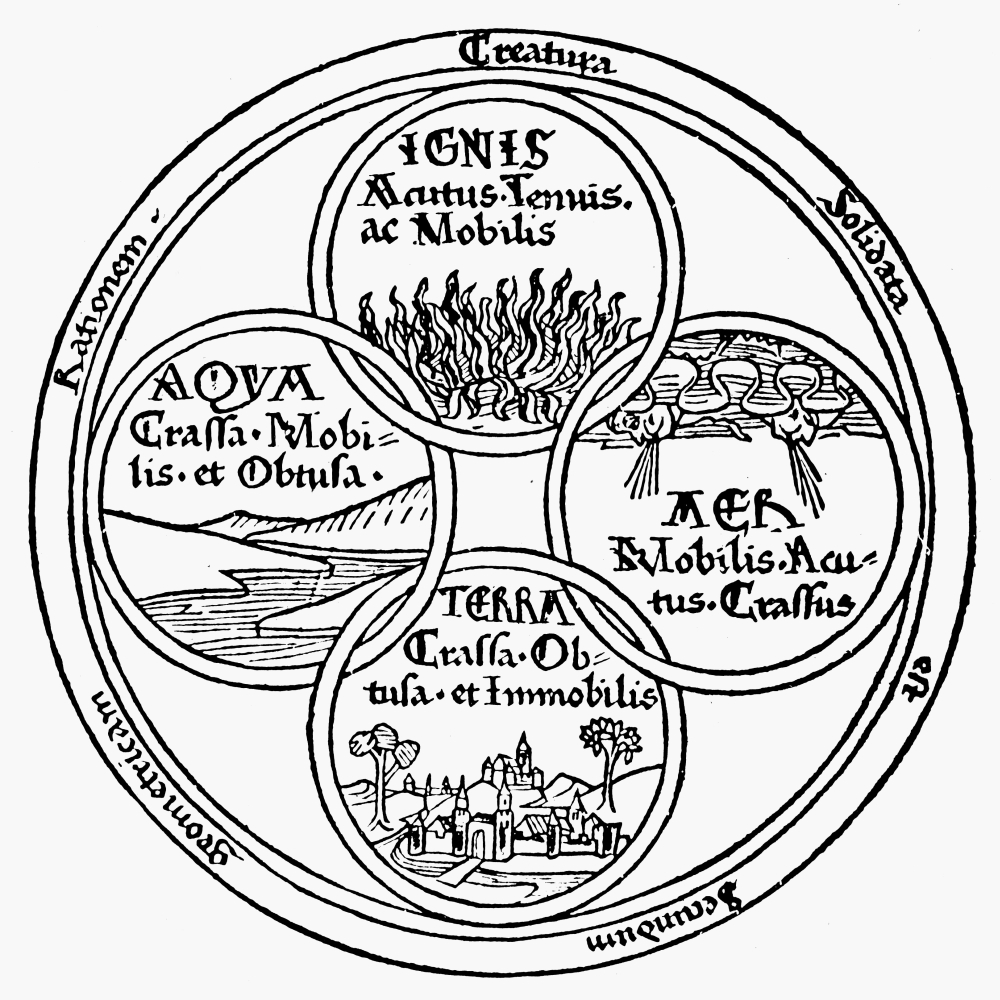 Empedocles' theory four elements (fire, air, water and earth), woodcut from a 1472 edition of Lucretius' De rerum natura Empedocles established four ultimate elements which make all the structures in the world—fire, air, water, earth.[7][h] Empedocles called these four elements "roots",[8] which he also identified with the mythical names of Zeus, Hera, Nestis, and Aidoneus[i] (e.g., "Now hear the fourfold roots of everything: enlivening Hera, Hades, shining Zeus. And Nestis, moistening mortal springs with tears").[9] Empedocles never used the term "element" (στοιχεῖον, stoicheion), which seems to have been first used by Plato.[j][better source needed] According to the different proportions in which these four indestructible and unchangeable elements are combined with each other the difference of the structure is produced.[7] It is in the aggregation and segregation of elements thus arising, that Empedocles, like the atomists, found the real process which corresponds to what is popularly termed growth, increase or decrease. One interpreter describes his philosophy as asserting that "Nothing new comes or can come into being; the only change that can occur is a change in the juxtaposition of element with element."[7] This theory of the four elements became the standard dogma for the next two thousand years. The four elements, however, are simple, eternal, and unalterable, and as change is the consequence of their mixture and separation, it was also necessary to suppose the existence of moving powers that bring about mixture and separation. The four elements are both eternally brought into union and parted from one another by two divine powers, Love and Strife (Philotes and Neikos).[7] Love (φιλότης) is responsible for the attraction of different forms of what we now call matter, and Strife (νεῖκος) is the cause of their separation.[k] If the four elements make up the universe, then Love and Strife explain their variation and harmony. Love and Strife are attractive and repulsive forces, respectively, which are plainly observable in human behavior, but also pervade the universe. The two forces wax and wane in their dominance, but neither force ever wholly escapes the imposition of the other. 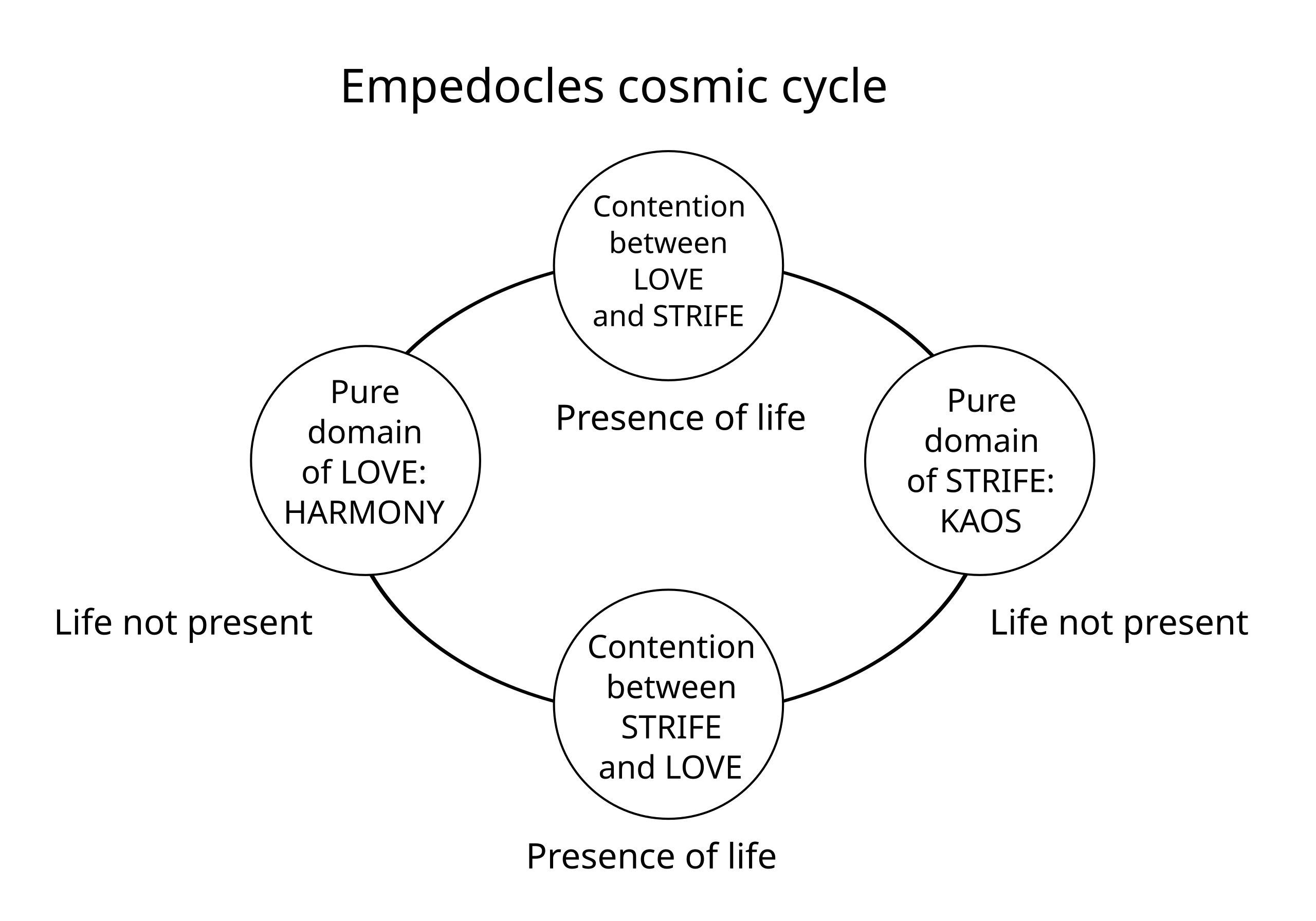 Empedocles' cosmic cycle is based on the conflict between love and strife. As the best and original state, there was a time when the pure elements and the two powers co-existed in a condition of rest and inertness in the form of a sphere.[7] The elements existed together in their purity, without mixture and separation, and the uniting power of Love predominated in the sphere: the separating power of Strife guarded the extreme edges of the sphere.[l] Since that time, strife gained more sway[7] and the bond which kept the pure elementary substances together in the sphere was dissolved. The elements became the world of phenomena we see today, full of contrasts and oppositions, operated on by both Love and Strife.[7] Empedocles assumed a cyclical universe whereby the elements return and prepare the formation of the sphere for the next period of the universe. Empedocles attempted to explain the separation of elements, the formation of earth and sea, of Sun and Moon, of atmosphere.[7] He also dealt with the first origin of plants and animals, and with the physiology of humans.[7] As the elements entered into combinations, there appeared strange results—heads without necks, arms without shoulders.[7][m] Then as these fragmentary structures met, there were seen horned heads on human bodies, bodies of oxen with human heads, and figures of double sex.[7][n] But most of these products of natural forces disappeared as suddenly as they arose; only in those rare cases where the parts were found to be adapted to each other did the complex structures last.[7] Thus the organic universe sprang from spontaneous aggregations that suited each other as if this had been intended.[7] Soon various influences reduced creatures of double sex to a male and a female, and the world was replenished with organic life.[7] |
哲学 関連項目: 古代ギリシャの五元素説 § ヘレニズム哲学 現存する断片から判断すると、現代の学者は一般的にエンペドクレスがパルメニデスの単一論に直接応答しており、アナクサゴラスの著作にも精通していたと考 える。ただし、後のエレア学派や原子論者の学説については知らなかった可能性が高い。[5] 彼の転生説に基づき、多くの後世の伝記はエンペドクレスがピタゴラス派に学んだと主張するが、実際にはピタゴラス派から直接ではなく、地元の伝統から学ん だ可能性もある。[5] しかし現代ギリシャの哲学者ヘレ・ランブリディスが論じたように、エンペドクレスはエレア学派(中心にパルメニデスを置く)やヘラクレイトス学派、ピタゴ ラス学派の思想から借用したようだが、彼自身の哲学はこれら三つの影響とは大きく異なる。ランブリディスによれば、エンペドクレスの著作は、エジプトやバ ビロン、その他の東方文化から要素を借用しつつ全く異なる哲学を生み出した、ギリシャ人全体の業績と関連付けて捉える必要がある。[6] 宇宙生成論  エンペドクレスの四元素説(火、空気、水、地)。ルクレティウスの『物性論』1472年版の木版画 エンペドクレスは世界を構成する四つの究極的元素——火、空気、水、地——を確立した。[7][h]エンペドクレスはこの四元素を「根源」と呼び[8]、 神話上のゼウス、ヘラ、ネスティス、アイドネウス[i]の名と同一視した(例:「今こそ万物の四つの根源を聞け:生命を与えるヘラ、冥界のゼウス、輝くゼ ウス。そして涙で死すべき泉を潤すネスティス」)。エンペドクレスは「元素」(στοιχεῖον, stoicheion)という用語を一度も使わなかった。この用語はプラトンが初めて使ったと思われる。[j][より良い出典が必要] この四つの不滅で不変の元素が互いに組み合わさる比率の違いによって、構造の違いが生み出されるのだ。[7] このように生じる元素の集合と分離の中に、エンペドクレスは原子論者たちと同様に、一般に成長・増加・減少と呼ばれる現象に対応する真の過程を見出した。 ある解釈者は彼の哲学を「新たなものは何一つ生じず、生じ得ない。起こり得る唯一の変化とは、元素と元素の並置関係の変化である」と主張するものだと説明 している。[7] この四元素説は、その後二千年にわたり標準的な教義となった。 しかし四元素は単純で永遠かつ不変であり、変化はその混合と分離の結果であるため、混合と分離をもたらす運動力を仮定する必要があった。四元素は、愛 (φιλότης)と争い(νεῖκος)という二つの神聖な力によって、永遠に結合され、また分離される。[7] 愛は、現代で物質と呼ぶ異なる形態の吸引を担い、争いはそれらの分離の原因である。[k] もし四元素が宇宙を構成するなら、愛と争いはその多様性と調和を説明する。愛と争いはそれぞれ引力と斥力であり、人間の行動に明瞭に観察されるだけでな く、宇宙全体に遍在する。二つの力は支配力を増減させるが、いずれの力も他方の影響から完全に逃れることはない。  エンペドクレスの宇宙循環は、愛と争いの対立に基づいている。 最良かつ原初の状態として、純粋な元素と二つの力が球体の形で静止と無活動の状態に共存していた時代があった[7]。元素は混ざり合いも分離もなく純粋な 状態で共存し、球体内では結合する力である愛が優勢だった。分離する力である争いは球体の端を守っていた。[l] その後、争いが勢力を増し[7]、球体内で純粋な元素物質を結びつけていた絆は解けた。元素は今日我々が目にする現象の世界となり、対照と対立に満ち、愛 と争いの両方に作用されるようになった[7]。エンペドクレスは循環する宇宙を想定し、元素が戻ってきて球体の形成を準備し、次の宇宙の周期を迎えるとい う。 エンペドクレスは元素の分離、大地と海、太陽と月、大気の形成を説明しようとした[7]。また植物と動物の最初の起源、そして人間の生理学についても論じ た。[7] 元素が結合する過程で、奇妙な結果が現れた――首のない頭、肩のない腕である。[7][m] こうした断片的な構造が結合すると、人間の体に角の生えた頭、牛の体に人間の頭、両性具有の姿が見られた。[7][n] しかし自然の力が生み出したこれらの産物の大半は、現れたのと同じように突然消え去った。稀に、各部分が互いに適合していると判明した場合のみ、複雑な構 造体が存続したのである。[7] このようにして有機的な宇宙は、あたかも意図されたかのように互いに適合する自発的な集合体から生まれたのだ。[7] 間もなく様々な影響により両性具有の生物は雄と雌に分化され、世界は有機的生命で満たされたのである。[7] |
| Psychology Like Pythagoras, Empedocles believed in the transmigration of the soul or metempsychosis, that souls can be reincarnated between humans, animals and even plants.[o] According to him, all humans, or maybe only a selected few among them,[10] were originally long-lived daimons who dwelt in a state of bliss until committing an unspecified crime, possibly bloodshed or perjury.[10][11] As a consequence, they fell to Earth, where they would be forced to spend 30,000 cycles of metempsychosis through different bodies before being able to return to the sphere of divinity.[10][11] One's behavior during his lifetime would also determine his next incarnation.[10] Wise people, who have learned the secret of life, are closer to the divine,[7][p] while their souls similarly are closer to the freedom from the cycle of reincarnations, after which they are able to rest in happiness for eternity.[q] This cycle of mortal incarnation seems to have been inspired by the god Apollo's punishment as a servant to Admetus.[11] 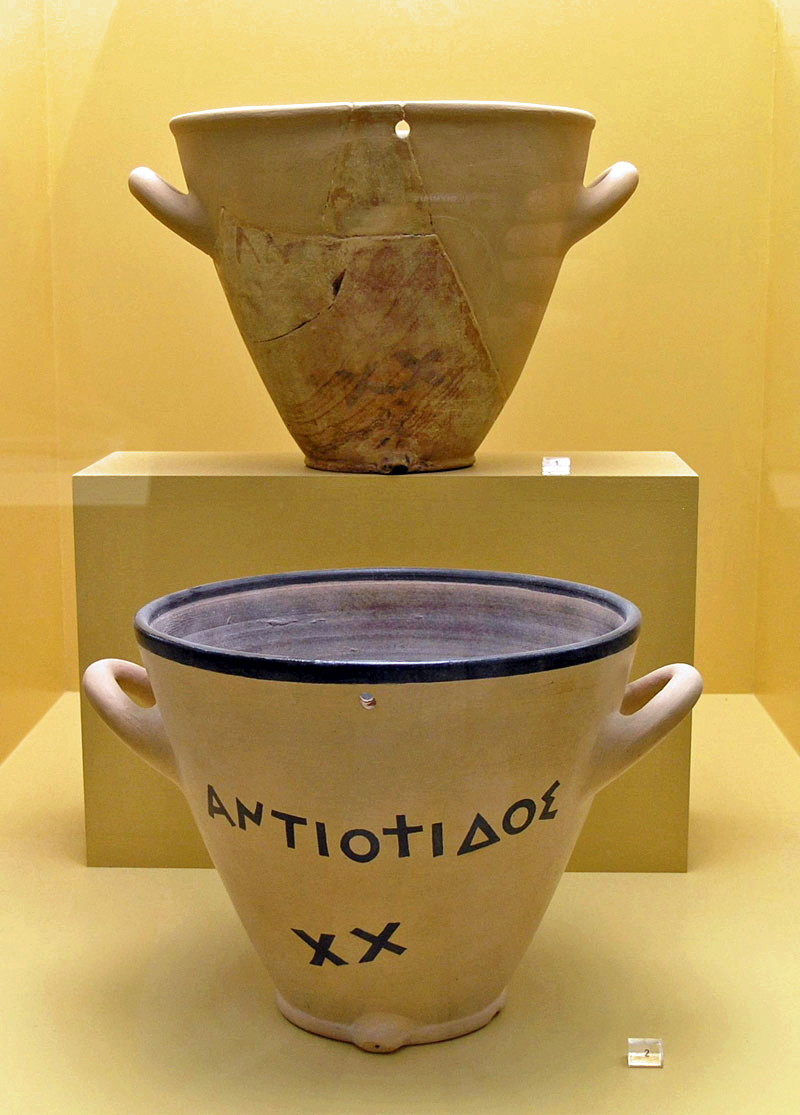 A display of two 5th century BCE clepsydras, or "water clocks" from the Ancient Agora Museum in Athens Empedocles was a vegetarian[r][12] and advocated vegetarianism, since the bodies of animals are also dwelling places of punished souls.[s] For Empedocles, all living things were on the same spiritual plane; plants and animals are links in a chain where humans are a link too.[7] Empedocles is credited with the first comprehensive theory of light and vision. Historian Will Durant noted that "Empedocles suggested that light takes time to pass from one point to another."[13][14] He put forward the idea that we see objects because light streams out of our eyes and touches them. While flawed, this became the fundamental basis on which later Greek philosophers and mathematicians like Euclid would construct some of the most important theories of light, vision, and optics.[15][better source needed] Knowledge is explained by the principle that elements in the things outside us are perceived by the corresponding elements in ourselves.[t] Like is known by like. The whole body is full of pores and hence respiration takes place over the whole frame. In the organs of sense these pores are specially adapted to receive the effluences which are continually rising from bodies around us; thus perception occurs.[u] In vision, certain particles go forth from the eye to meet similar particles given forth from the object, and the resultant contact constitutes vision.[v] Perception is not merely a passive reflection of external objects.[16][better source needed] Empedocles also attempted to explain the phenomenon of respiration by means of an elaborate analogy with the clepsydra, an ancient device for conveying liquids from one vessel to another.[w][17] This fragment has sometimes been connected to a passage[x] in Aristotle's Physics where Aristotle refers to people who twisted wineskins and captured air in clepsydras to demonstrate that void does not exist. The fragment certainly implies that Empedocles knew about the corporeality of air, but he says nothing whatever about the void, and there is no evidence that Empedocles performed any experiment with clepsydras.[17] |
心理学 ピタゴラスと同様に、エンペドクレスは魂の輪廻転生、すなわち魂が人間、動物、さらには植物の間で生まれ変わることを信じていた。[o] 彼によれば、全ての人間、あるいは選ばれた少数のみ[10]は、もともと長寿の精霊(ダイモン)であり、特定の罪(おそらく流血や偽証)を犯すまでは至福 の状態に暮らしていた。その結果、彼らは地上に堕ち、神性の領域へ戻れるようになるまで、異なる肉体を通じて3万回の輪廻転生を強いられることになる。 [10][11] 人の生前の行いは、次の転生先も決定する。[10] 生命の秘義を悟った賢者は神性に近く[7][p]、その魂も同様に輪廻の束縛から解放されやすく、その後永遠の幸福に安らぐことができる[q]。この死す べき者の転生サイクルは、アポロン神がアドメトスの僕として罰せられた神話に由来するようだ[11]。  アテネ古代アゴラ博物館所蔵の紀元前5世紀の水時計(クレプシドラ)二点展示 エンペドクレスは菜食主義者であり[r][12]、動物の身体も罰せられた魂の住処であるとして菜食を提唱した[s]。彼にとって全ての生き物は同じ精神的次元にあり、植物や動物は人間も含まれる連鎖の一環であった。[7] エンペドクレスは光と視覚に関する最初の包括的理論を提唱したとされる。歴史家ウィル・デュラントは「エンペドクレスは光が一点から他点へ到達するには時 間を要すると示唆した」と記している[13][14]。彼は、我々が物体を見るのは光が我々の目から流れ出てそれらに触れるからだという考えを提示した。 この理論には欠陥があったものの、後にユークリッドのようなギリシャの哲学者や数学者が、光・視覚・光学に関する最も重要な理論を構築する基礎となった。 [15][より良い出典が必要] 知識は、外界の事物にある要素が、我々自身の中にある対応する要素によって知覚されるという原理で説明される。[t] 似たものは似たものによって知られる。全身は毛穴で満たされており、したがって呼吸は全身を通じて行われる。感覚器官においては、これらの孔は周囲の物体 から絶えず発せられる気流を受け取るよう特別に適応している。こうして知覚が生じるのだ。[u] 視覚においては、特定の粒子が眼から発せられ、対象物から放出される類似の粒子と出会い、その結果生じる接触が視覚を構成する。[v] 知覚は単に外部対象の受動的な反映ではないのだ。[16][より良い出典が必要] エンペドクレスはまた、呼吸の現象を、液体を一つの容器から別の容器へ移す古代の装置である漏斗(クレプシドラ)との精巧な類推によって説明しようとし た。[w][17] この断片は、アリストテレスの『物理学』にある一節[x]と関連づけられることがある。そこではアリストテレスが、空袋を捻って漏斗に空気を閉じ込める人 々を例に挙げて、虚空は存在しないと論じている。この断片は確かにエンペドクレスが空気の物質性を認識していたことを示唆しているが、虚空については一切 言及しておらず、エンペドクレスが水時計を用いた実験を行った証拠は存在しない。[17] |
Writings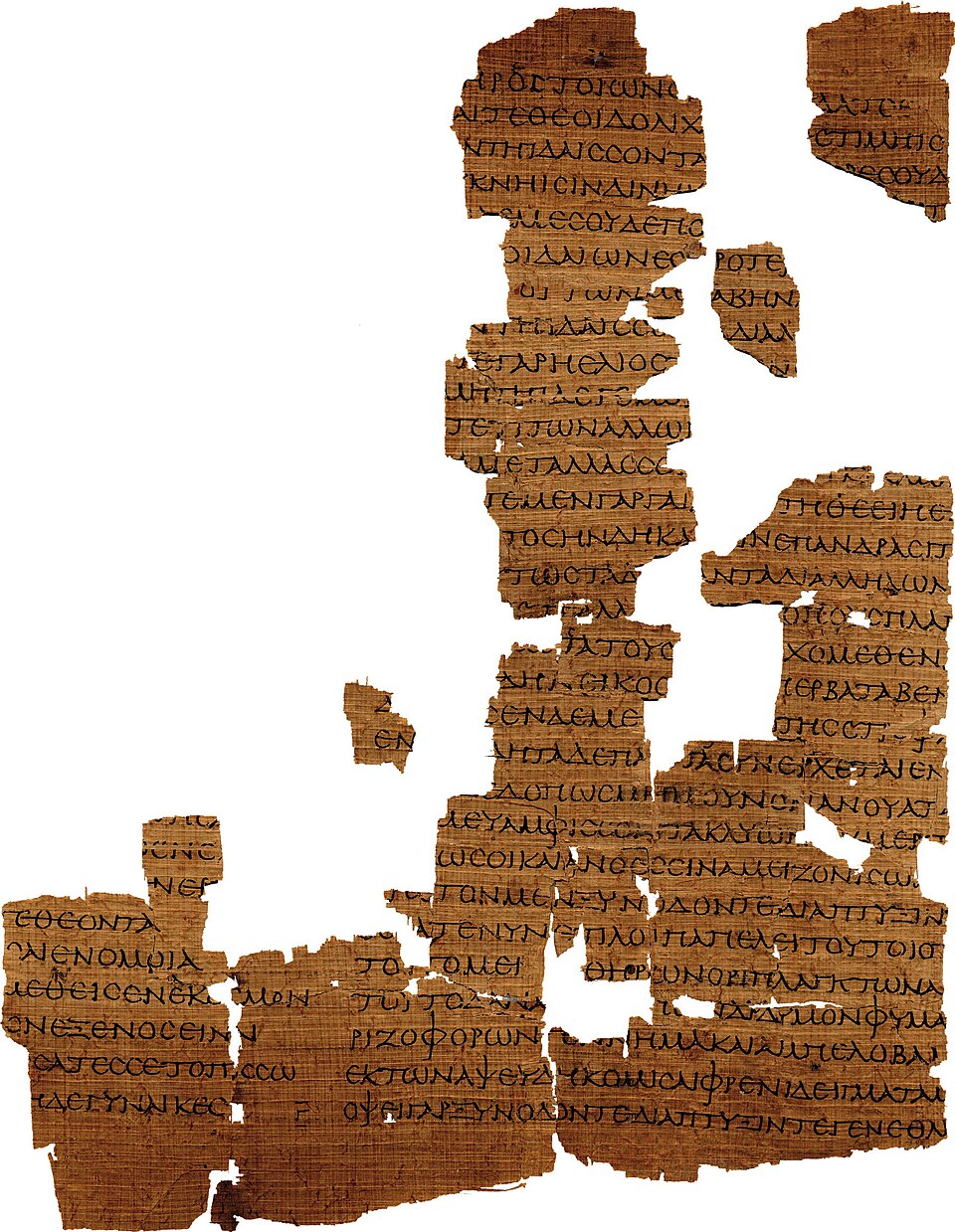 The Strasbourg Empedocles papyrus contained over 50 lines from Empedocles' work On Nature that were not published until 1999.[18] According to Diogenes Laertius,[y] Empedocles wrote two poems, "On Nature" and "On Purifications", which together comprised 5000 lines. However, only some 550 lines of his poetry survive, quoted in fragments by later ancient sources. In old editions of Empedocles, about 450 lines were ascribed to "On Nature" which outlined his philosophical system, and explains not only the nature and history of the universe, including his theory of the four classical elements, but also theories on causation, perception, and thought, as well as explanations of terrestrial phenomena and biological processes. The other 100 lines were typically ascribed to his "Purifications", which was taken to be a poem about ritual purification, or the poem that contained all his religious and ethical thought, which early editors supposed that it was a poem that offered a mythical account of the world which may, nevertheless, have been part of Empedocles' philosophical system. A late 20th century discovery has changed this situation. The Strasbourg papyrus[18][z] contains a large section of "On Nature", including many lines formerly attributed to "On Purifications".[19] This has raised considerable debate[20][21] about whether the surviving fragments of his teaching should be attributed to two separate poems, with different subject matter; whether they may all derive from one poem with two titles;[22] or whether one title refers to part of the whole poem. |
著作 ストラスブール・エンペドクレス・パピルスには、エンペドクレスの著作『自然について』から50行以上が含まれていたが、これらは1999年まで公表されなかった。[18] ディオゲネス・ラエルティオスによれば、エンペドクレスは『自然について』と『浄化について』という二つの詩を書き、これらは合わせて5000行を構成していた。しかし現存するのは約550行のみで、後代の古代文献に断片的に引用されている。 エンペドクレスの古版では、約450行が『自然について』に帰属されていた。この著作は彼の哲学体系を概説し、四元素説を含む宇宙の性質と歴史だけでな く、因果関係・知覚・思考に関する理論、さらに地上の現象や生物学的過程の説明も扱っている。残りの100行は通常『浄化論』に帰属され、儀礼浄化に関す る詩、あるいは彼の宗教的・倫理的思考を全て含む詩と解釈されてきた。初期の編集者たちは、この詩が世界の神話的説明を提供するものと推測したが、それは エンペドクレスの哲学体系の一部であった可能性もある。 20世紀後半の発見がこの状況を変えた。ストラスブール・パピルス[18][z]には『自然について』の大部分が収められており、かつて『浄化について』 に帰属していた多くの行も含まれている。[19] これにより、現存する断片を主題の異なる二つの別々の詩に帰すべきか、あるいは二つの題名を持つ一つの詩に由来するものか、あるいは一つの題名が全体の断 片を指すものかについて、大きな議論[20][21]が巻き起こった。 |
| Notes Diogenes Laërtius, viii. 51 Aristotle, Poetics, 1, ap. Diogenes Laërtius, viii. 57. Apollonius, ap. Diogenes Laërtius, viii. 52, comp. 74, 73 Diogenes Laërtius, viii. 67, 69, 70, 71; Horace, ad Pison. 464, etc. Diogenes Laërtius, viii. 69 See especially Lucretius, i. 716, etc.[4] Horace Ars Poetica Frag. B17 (Simplicius, Physics, 157–159) Frag. B6 (Sextus Empiricus, Against the Mathematicians, x, 315) Plato, Timaeus, 48b–c Frag. B35, B26 (Simplicius, Physics, 31–34) Frag. B35 (Simplicius, Physics, 31–34; On the Heavens, 528–530) Frag. B57 (Simplicius, On the Heavens, 586) Frag. B61 (Aelian, On Animals, xvi 29) Frag. B127 (Aelian, On Animals, xii. 7); Frag. B117 (Hippolytus, i. 3.2) Clement of Alexandria, Miscellanies, iv. 23.150 Clement of Alexandria, Miscellanies, v. 14.122 Plato, Meno Sextus Empiricus, Against the Mathematicians, ix. 127; Hippolytus, vii. 21 Frag. B109 (Aristotle, On the Soul, 404b11–15) Frag. B100 (Aristotle, On Respiration, 473b1–474a6) Frag. B84 (Aristotle, On the Senses and their Objects, 437b23–438a5) Aristotle, On Respiration 13 Aristotle, Physics, 213a24–7 Diogenes Laërtius, viii. 77 Not to be confused with the Strasbourg papyrus containing Christian prayers |
注 ディオゲネス・ラエルティオス、第八巻51 アリストテレス、『詩学』第一巻、ディオゲネス・ラエルティオスによる引用、第八巻57 アポロニオス、ディオゲネス・ラエルティオスによる引用、第八巻52、比較74、73 ディオゲネス・ラエルティオス、第八巻67、69、70、71;ホラティウス、ピソへの手紙464など ディオゲネス・ラエルティオス、第八巻69 特にルクレティウス、第一巻716など参照[4] ホラティウス『詩技論』 断片B17(シンプリキオス『物理学』157–159) 断片B6(セクストス・エンピリコス『数学者に対する論駁』x, 315) プラトン『ティマイオス』48b–c 断片B35, B26(シンプリキオス『物理学』31–34) 断片B35(シンプリキオス『物理学』31–34;『天界論』528–530) 断片B57(シンプリキオス『天界論』586) 断片B61(アエリウス『動物誌』xvi 29) 断片 B127(アエリアヌス『動物論』xii. 7);断片 B117(ヒッポリュトス i. 3.2) アレクサンドリアのクレメンス『雑録』iv. 23.150 アレクサンドリアのクレメンス『雑録』v. 14.122 プラトン『メノン』 セクストス・エンピリコス『数学者に対する反論』9.127;ヒッポリュトス7.21 断片B109(アリストテレス『魂について』404b11–15) 断片B100(アリストテレス『呼吸について』473b1–474a6) 断片B84(アリストテレス『感覚とその対象について』437b23–438a5) アリストテレス『呼吸論』13 アリストテレス『物理学』213a24–7 ディオゲネス・ラエルティオス、viii. 77 キリスト教の祈りを収めたストラスブール・パピルスと混同してはならない |
| References 1. Kingsley & Parry 2020, §1. 2. Inwood 2001, pp. 6–8. 3. Burnet 1892, pp. 202–203. 4. Sedley 2003. 5. Inwood 2001, p. 6-8. 6. Lambridis, Helle (1976). Empedocles: A Philosophical Investigation. Tuscaloosa: University of Alabama Press. pp. 38–39. 7. Wallace 1911. 8. Ströker, E. (September 1968). "Element and Compound. On the Scientific History of Two Fundamental Chemical Concepts". Angewandte Chemie International Edition in English. 7 (9): 718–724. doi:10.1002/anie.196807181. ISSN 0570-0833. 9. Kingsley 1995. 10. Inwood 2001, pp. 55–68. 11. Primavesi 2008, pp. 261–268. 12. Fragments of Empedocles 136 - 139 13. Durant, Will. The Story of Civilization, Volume 2: The Life of Greece (New York; Simon & Schuster) 1939, p. 339. 14. Empedocles (and with him all others who used the same forms of expression) was wrong in speaking of light as 'travelling' or being at a given moment between the earth and its envelope, its movement being unobservable by us; that view is contrary both to the clear evidence of argument and to the observed facts; if the distance traversed were short, the movement might have been unobservable, but where the distance is from extreme East to extreme West, the draught upon our powers of belief is too great. Aristotle, On the soul 418b 15. Let There be Light 7 August 2006 01:50 BBC Four 16. "Empedocles – Encyclopedia". 17. Barnes 2002, p. 313. 18. Martin & Primavesi 1999. 19. Kingsley & Parry 2020. 20. Inwood 2001, pp. 8–21. 21. Trépanier 2004. 22. Osborne 1987, pp. 24–31, 108. |
参考文献 1. キングズリー&パリー 2020, §1. 2. インウッド 2001, pp. 6–8. 3. バーネット 1892, pp. 202–203. 4. セドリー 2003. 5. インウッド 2001, p. 6-8. 6. ランブリディス, ヘレ (1976). 『エンペドクレス: 哲学探究』. タスカルーサ: アラバマ大学出版局. pp. 38–39. 7. ウォレス 1911. 8. シュトローカー, E. (1968年9月). 「元素と化合物. 二つの基礎的な化学概念の科学的歴史について」. 応用化学国際版英語版。7巻9号:718–724頁。doi:10.1002/anie.196807181。ISSN 0570-0833。 9. キングズリー 1995年。 10. インウッド 2001年、55–68頁。 11. プリマヴェージ 2008, pp. 261–268. 12. エンペドクレス断片 136 - 139 13. デュラント, ウィル. 『文明の物語』第2巻: ギリシャの生涯 (ニューヨーク; サイモン・アンド・シュスター) 1939, p. 339. 14. エンペドクレス(および彼と同じ表現形式を用いた他の者たち)は、光が「移動する」とか、ある瞬間には地球とその外殻の間に存在すると述べた点で誤ってい た。その動きは我々には観測不可能である。この見解は、論証の明らかな証拠にも、観測された事実にも反する。移動距離が短ければ、その動きは観察不可能 だったかもしれないが、移動距離が極東から極西までであるならば、我々の信じる力を引き出すには大きすぎる。アリストテレス、『魂について』 418b 15. 『光あれ』 2006年8月7日 01:50 BBC Four 16. 「エンペドクレス – 百科事典」。 17. バーンズ 2002、313 ページ。 18. マーティン&プリマヴェシ 1999。 19. キングスリー&パリー 2020。 20. インウッド 2001、8-21 ページ。 21. トレパニエ 2004。 22. オスボーン 1987、24-31 ページ、108 ページ。 |
| Bibliography Ancient Testimony Laërtius, Diogenes. "Pythagoreans: Empedocles" . Lives of the Eminent Philosophers. Vol. 2:8. Translated by Hicks, Robert Drew (Two volume ed.). Loeb Classical Library. References Barnes, Jonathan (11 September 2002). The Presocratic Philosophers. Routledge. ISBN 978-1-134-96512-0. Burnet, John (1892). Early Greek Philosophy. Adam and Charles Black. Inwood, Brad (2001). The Poem of Empedocles: A Text and Translation with an Introduction (Revised ed.). University of Toronto Press. ISBN 978-0-8020-8353-1. Guthrie, W. K. C. (1962). A History of Greek Philosophy: Volume 2, The Presocratic Tradition from Parmenides to Democritus. Cambridge University Press. ISBN 978-0-521-29421-8. Kingsley, K. Scarlett; Parry, Richard (2020). "Empedocles". In Zalta, Edward N. (ed.). Stanford Encyclopedia of Philosophy. Kingsley, Peter (1995). Ancient Philosophy, Mystery, and Magic: Empedocles and Pythagorean Tradition. Oxford: Clarendon Press. ISBN 0-19-814988-3. Martin, Alain; Primavesi, Oliver (1999). L'Empédocle de Strasbourg: (P. Strasb. gr. Inv. 1665-1666) (in French). Walter de Gruyter. ISBN 978-3-11-015129-9. Primavesi, Oliver (27 October 2008). "Empedocles: Physical and Mythical Divinity". In Curd, Patricia; Graham, Daniel W. (eds.). The Oxford Handbook of Presocratic Philosophy. Oxford University Press, US. ISBN 978-0-19-514687-5. Osborne, Catherine (1987). Rethinking early Greek philosophy : Hippolytus of Rome and the Presocratics. London: Duckworth. ISBN 0-7156-1975-6. Sedley, D. N. (2003). Lucretius and the Transformation of Greek Wisdom. Cambridge University Press. ISBN 978-0-521-54214-2. Trépanier, Simon (2004). Empedocles: An Interpretation. Routledge. ISBN 978-0-415-96700-6. Wallace, William (1911). "Empedocles" . Encyclopædia Britannica. Vol. 9 (11th ed.). pp. 344–345. Wright, M. R. (1995). Empedocles: The Extant Fragments (new ed.). London: Bristol Classical Press. ISBN 1-85399-482-0. Further reading Chitwood, Ava (2004). Death by philosophy : the biographical tradition in the life and death of the archaic philosophers Empedocles, Heraclitus, and Democritus. Ann Arbor: University of Michigan Press. ISBN 9780472113880. Campbell, Gordon. "Empedocles". In Fieser, James; Dowden, Bradley (eds.). Internet Encyclopedia of Philosophy. ISSN 2161-0002. OCLC 37741658. Freeman, Kathleen (1948). Ancilla to the Pre-Socratic Philosophers: A Complete Translation of the Fragments in Diels Fragmente Der Vorsokratiker. Forgotten Books. ISBN 978-1-60680-256-4. Gottlieb, Anthony (2000). The Dream of Reason: A History of Western Philosophy from the Greeks to the Renaissance. London: Allen Lane. ISBN 0-7139-9143-7. Kirk, G. S.; Raven, J.E.; Schofield, M. (1983). The Presocratic Philosophers: A Critical History (2nd ed.). Cambridge: Cambridge University Press. ISBN 0-521-25444-2. Lambridis, Helle (1976). Empedocles : a philosophical investigation. Tuscaloosa, AL: University of Alabama Press. ISBN 0-8173-6615-6. Long, A. A. (1999). The Cambridge Companion to Early Greek Philosophy. Cambridge: Cambridge University Press. ISBN 0-521-44122-6. Saetta Cottone, Rossella (2023). Soleil et connaissance. Empédocle avant Platon. Paris: Les Belles Lettres. ISBN 9782350882031. Stamatellos, Giannis (2007). Plotinus and the Presocratics: A Philosophical Study of Presocratic Influences in Plotinus' Enneads. Albany: SUNY Press. Stamatellos, Giannis (2012). Introduction to Presocratics: A Thematic Approach to Early Greek Philosophy with Key Readings. Wiley-Blackwell. Wellmann, Tom (2020). Die Entstehung der Welt. Studien zum Straßburger Empedokles-Papyrus. Berlin/Boston: Walter de Gruyter. ISBN 978-3-11-063372-6. |
参考文献 古代の証言 ディオゲネス・ラエルティオス『著名な哲学者列伝』第2巻8章「ピタゴラス学派:エンペドクレス」ロバート・ドリュー・ヒックス訳(全2巻)。ローブ古典叢書。 参考文献 ジョナサン・バーンズ(2002年9月11日)『前ソクラテス派哲学者』ラウトリッジ。ISBN 978-1-134-96512-0。 バーネット、ジョン(1892)。『初期ギリシャ哲学』。アダム・アンド・チャールズ・ブラック社。 インウッド、ブラッド(2001)。『エンペドクレスの詩:序文付きテキストと翻訳』(改訂版)。トロント大学出版局。ISBN 978-0-8020-8353-1。 ガスリー、W. K. C.(1962)。『ギリシャ哲学史:第2巻、パルメニデスからデモクリトスまでの前ソクラテス派の伝統』。ケンブリッジ大学出版局。ISBN 978-0-521-29421-8。 キングスリー、K. スカーレット、パリー、リチャード (2020). 「エンペドクレス」. ザルタ、エドワード N. (編). スタンフォード哲学百科事典. キングスリー、ピーター (1995). 古代哲学、神秘、そして呪術:エンペドクレスとピタゴラス学派の伝統. オックスフォード:クラレンドン・プレス. ISBN 0-19-814988-3。 マーティン、アラン;プリマヴェシ、オリバー(1999)。『ストラスブールのエンペドクレス:(P. Strasb. gr. Inv. 1665-1666)』(フランス語)。ウォルター・デ・グルイター。ISBN 978-3-11-015129-9。 プリマヴェージ、オリバー (2008年10月27日). 「エンペドクレス:物理的かつ神話的な神性」. パトリシア・カード、ダニエル・W・グラハム (編). 『オックスフォード・プレソクラテス哲学ハンドブック』. オックスフォード大学出版局、米国. ISBN 978-0-19-514687-5. オズボーン、キャサリン (1987). 『初期ギリシャ哲学の再考:ローマのヒッポリュトスと前ソクラテス派』. ロンドン:ダックワース. ISBN 0-7156-1975-6. セドリー、D. N. (2003). 『ルクレティウスとギリシャの知恵の変容』. ケンブリッジ大学出版局. ISBN 978-0-521-54214-2. トレパニエ、サイモン(2004)。『エンペドクレス:解釈』ラウトリッジ。ISBN 978-0-415-96700-6。 ウォレス、ウィリアム(1911)。「エンペドクレス」『ブリタニカ百科事典』第9巻(第11版)。344–345頁。 ライト、M. R.(1995)。『エンペドクレス:現存する断片』(新版)。ロンドン:ブリストル古典出版社。ISBN 1-85399-482-0。 追加文献(さらに読む) チットウッド、アヴァ(2004)。哲学による死:古代哲学者エンペドクレス、ヘラクレイトス、デモクリトスの生と死における伝記的伝統。アナーバー:ミシガン大学出版局。ISBN 9780472113880。 キャンベル、ゴードン。「エンペドクレス」。フィザー、ジェームズ、ダウデン、ブラッドリー(編)。インターネット哲学百科事典。ISSN 2161-0002。OCLC 37741658。 フリーマン、キャスリーン(1948)。『ソクラテス以前の哲学者たちへのアンシラ:ディールス『Fragmente Der Vorsokratiker』の断片の完全翻訳』。Forgotten Books。ISBN 978-1-60680-256-4。 ゴットリーブ、アンソニー (2000)。『理性の夢:ギリシャからルネサンスまでの西洋哲学史』。ロンドン:アレン・レーン。ISBN 0-7139-9143-7。 カーク、G. S.、レイヴン、J.E.、スコフィールド、M. (1983)。『ソクラテス以前の哲学者たち:批判的歴史(第 2 版)』。ケンブリッジ:ケンブリッジ大学出版局。ISBN 0-521-25444-2。 ランブリディス、ヘレ(1976)。『エンペドクレス:哲学探究』。タスカルーサ、アラバマ州:アラバマ大学出版局。ISBN 0-8173-6615-6。 ロング、A. A. (1999). 『ケンブリッジ初期ギリシャ哲学事典』. ケンブリッジ: ケンブリッジ大学出版局. ISBN 0-521-44122-6. サエッタ・コットーネ、ロッセラ (2023). 『太陽と認識:プラトン以前のエンペドクレス』. パリ: レ・ベル・レター. ISBN 9782350882031. スタマテロス、ヤニス(2007)。『プロティノスと前ソクラテス派:プロティノスの『エンネアデス』における前ソクラテス派の影響に関する哲学的研究』。オールバニ:SUNYプレス。 スタマテロス、ヤニス(2012)。『前ソクラテス派入門:主要文献による初期ギリシャ哲学のテーマ別アプローチ』。ワイリー・ブラックウェル。 ウェルマン、トム(2020年)。『世界の生成。ストラスブール・エンペドクレス・パピルス研究』。ベルリン/ボストン:ウォルター・デ・グリュイター。ISBN 978-3-11-063372-6。 |
| https://en.wikipedia.org/wiki/Empedocles |
リンク
文献
Copyleft, CC, Mitzub'ixi Quq Chi'j, 1996-2099

Thomas
Aquinas, by Carlo Crivelli (1430-1495)
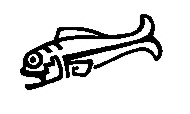
++
Copyleft,
CC, Mitzub'ixi Quq Chi'j, 1996-2099